About the Bird Photographer of the Year competition
The winning images of Bird Photographer of the Year were announced in a livestreamed ceremony on Thursday 8th September 2022.
More than 20,000 images were submitted to to the competition this year, from photographers around the world.
“Once again our talented photographers have cast a light on the incredible diversity of bird life that we share our planet with,” says Will Nicholls, director of the Bird Photographer of the Year competition. “But it is also a stark reminder of what we stand to lose if we don’t continue to look after the natural world and fight for its protection from the many threats that exist today.”
The overall Bird Photographer of the Year accolade was awarded to the Norwegian photographer Erlend Haarberg for his image of a rock ptarmigan in Tysfjord, Norway.
“High up in the mountains, the wind, snow and cold maintain the iron grip of winter for many months on end. This is where rock ptarmigan thrive in an endless white landscape,” says Haarberg. “On this particular winter’s day, I was on my way to a mountain top. I had almost reached the summit when I spotted some ptarmigan tracks in the snow. Soon a bird took flight, with the dramatic backdrop showing what a harsh environment this bird calls home.”
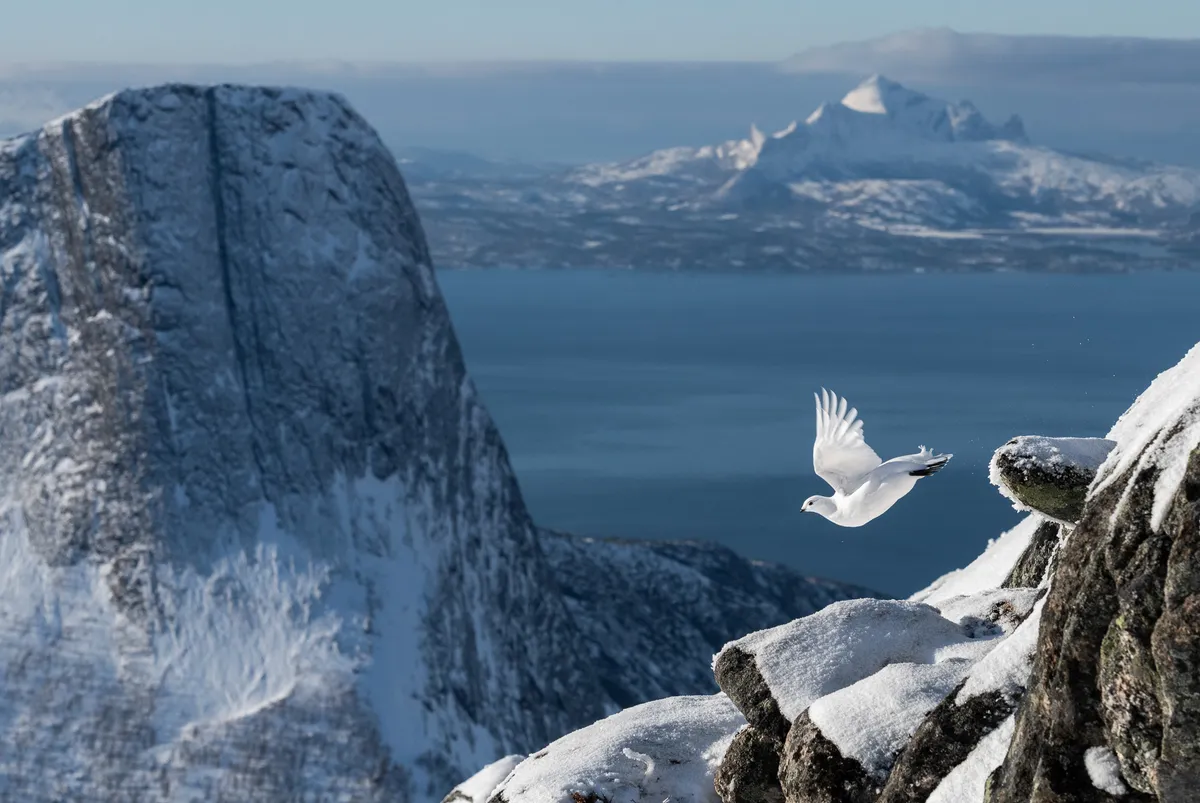
The Young Bird Photographer of the Year award was given to Levi Firze, a 17-year old Swiss photographer, who captured the image of a dunlin in a sandstorm.
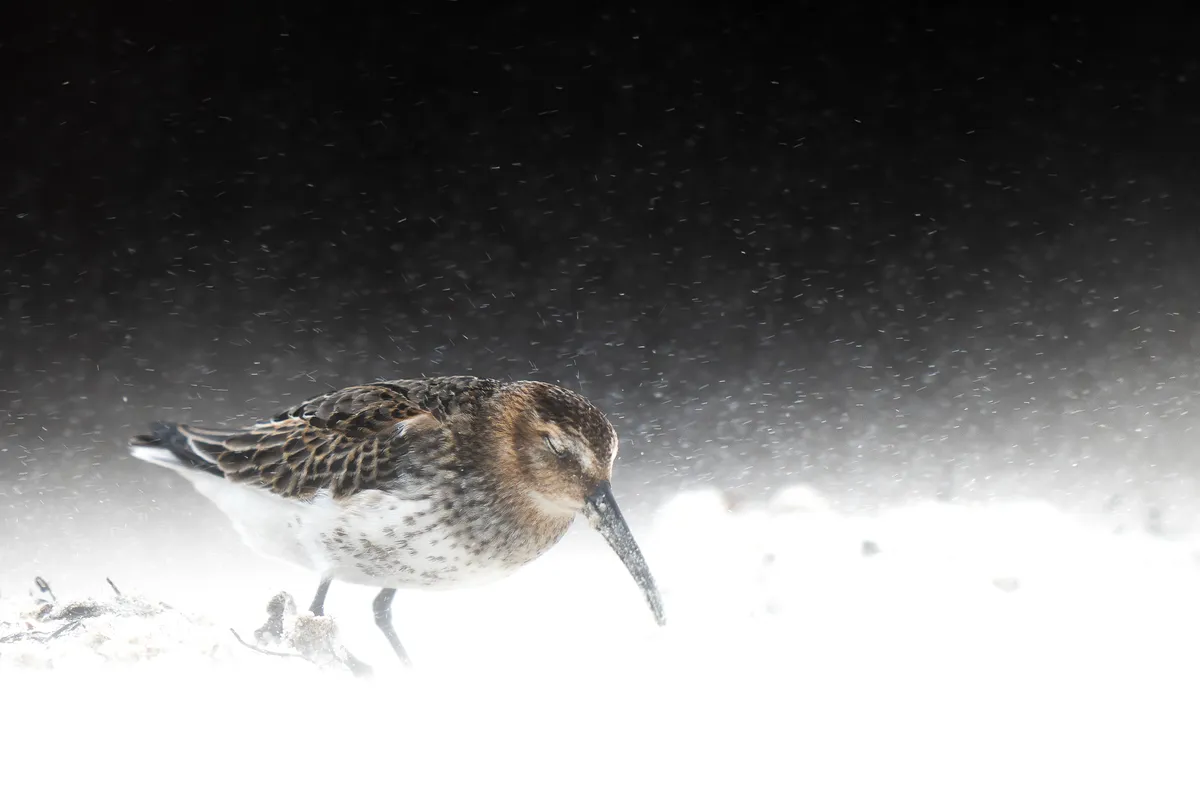
The were eight different categories open in the adult competition:
Best Portrait, Birds in the Environment, Attention to Detail, Bird Behaviour, Birds in Flight, Black and White, Urban Birds, and Creative Imagery. There was also a Conservation Award, Portfolio Award, and Video Award.
The Bird Photographer of the Year has donated £5,00 this year to its partner charity Birds on the Brink.
More images from Bird Photographer of the Year
The 2023 competition is open for entries from Friday 9th September 2022 on the Bird Photographer of the Year website, and invites photographers of all experience levels to submit their best bird photos. The competition closes on Sunday 11th December 2022, after which judging will begin.
Category: Birds in the Environment
Gold Award winner and overall Bird Photographer of the Year
Rock Ptarmigan Flight, by Erlend Haarberg (Norway).

High above the tree-line, the wind, snow and cold maintain the iron grip of winter for months on end. This is where rock ptarmigan thrive, small white feather-balls in an endless white landscape. On this particular winter day, I was on my way to a mountain top by Tysfjorden to photograph landscapes.
I had almost reached the summit when I spotted some ptarmigan tracks criss-crossing between the rocks, where the wind had uncovered some sparse vegetation. From behind a rock, a small head appeared, and seconds later it took to the wing with the mountains and fjord landscape in the background, setting the scene perfectly.
Nikon D850 with Nikon 70–200mm f/2.8 lens. Focal length 95mm; 1/2,500 second; f/10; ISO 800.
Silver Award winner
Kaleidoscope, Paul Mckenzie (Ireland).
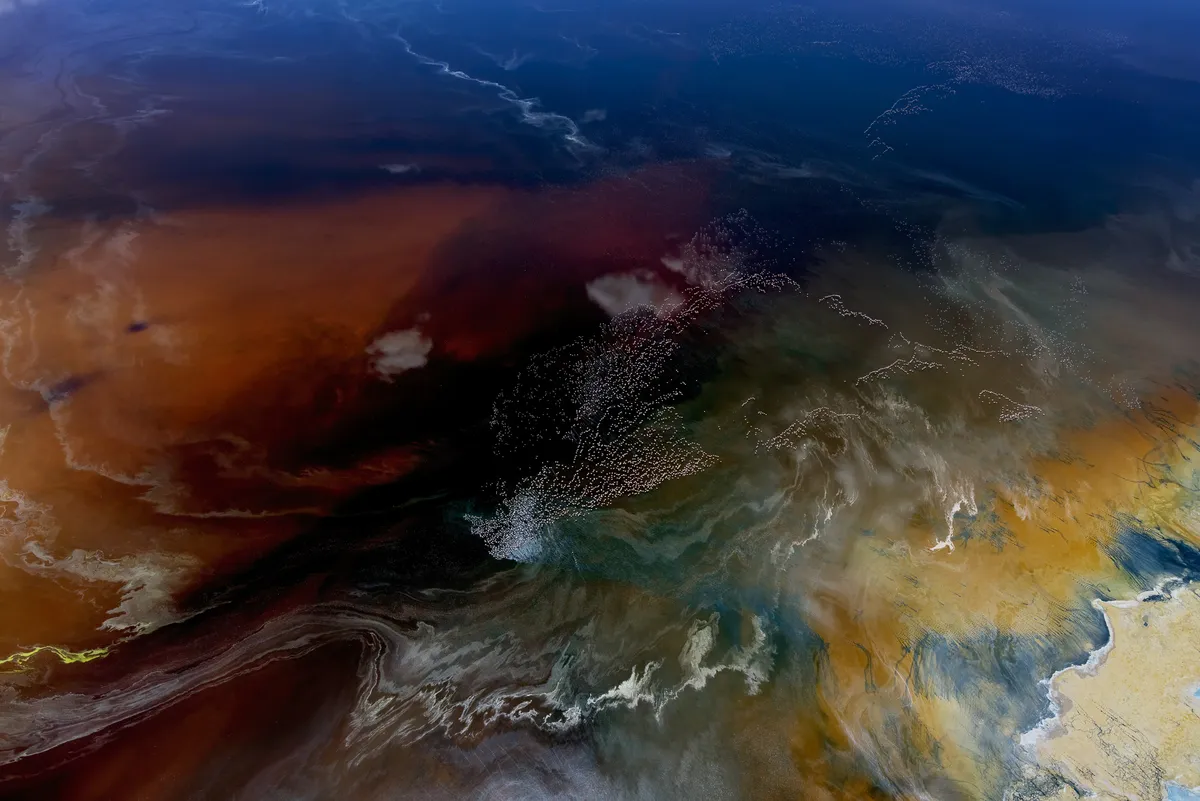
This image shows a small flock of lesser and greater flamingos as they fly over Lake Logipi in northern Kenya. Recent rains had covered the previously empty lake with a shallow depth of water. This had awakened dormant microscopic algae in the lake bed, which caused the red coloration in the image and mixed with yellow and brown sediment washed into the lake from the Suguta River.
High rates of evaporation resulting from searing air temperatures had begun to produce soda salt floes on the lake surface. Huge numbers of flamingos regularly gather on this remote lake to feed on the specialist brine invertebrates here, which themselves feed on the algae. I took this image from a light aircraft with the doors removed on one side.
Canon R5 with Canon 24–105mm f/4 lens. Focal length 24mm; 1/3,200 second; f/5; ISO 500.
Bronze Award winner
Free as a Bird, by Mario Suarez Porras (Spain).
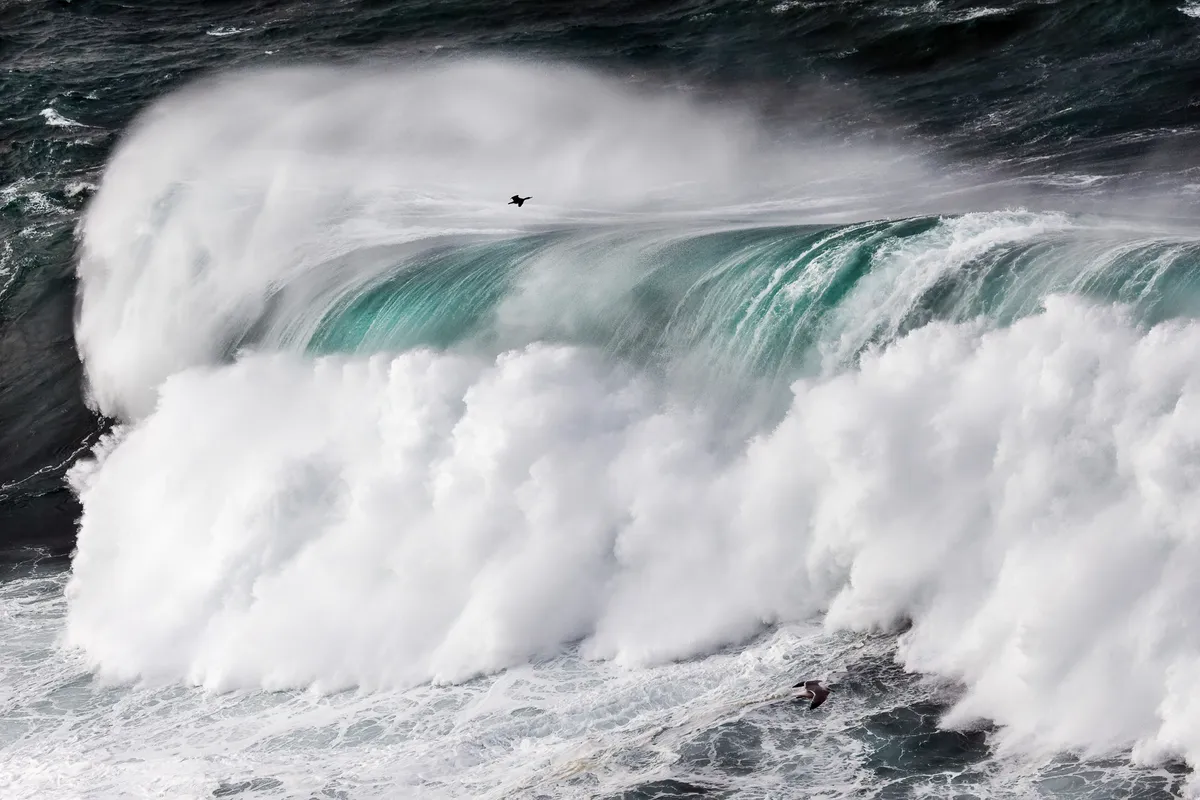
This image shows a European shag as it flies over a huge wave of about 8m high off the west coast of Asturias in northern Spain. It made me reflect on how lucky the bird was to be free and able to fly with strength and determination in the most difficult conditions.
Canon EOS 5D Mark IV with Canon 100–400mm f/4.5–5.6 II lens. Focal length 164mm; 1/4,000 second; f/8; ISO 1,250.
Category: Attention to Detail
Gold Award winner
Sleeping Beauty, by Andy Pollard (Falkland Islands).
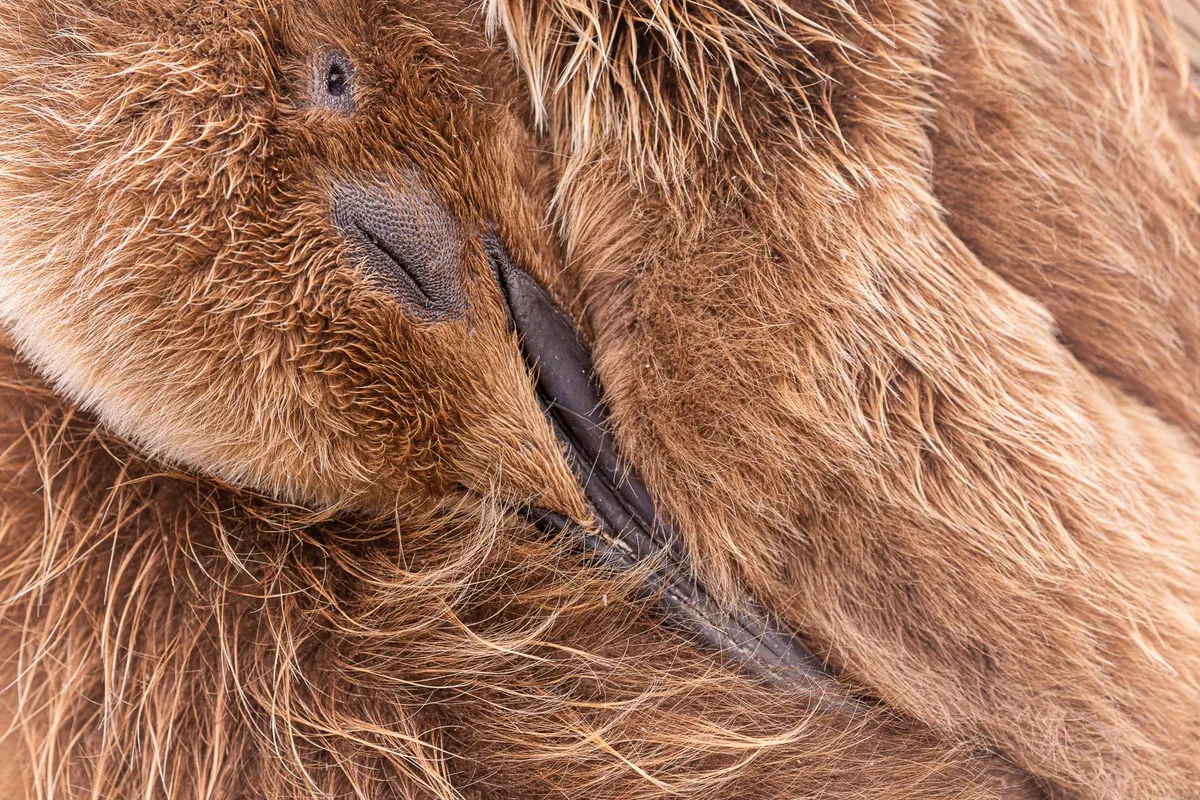
While most images of king penguins seem to be of striking adult birds, there is a definite cuteness to the chicks in their brown ‘teddy bear’ plumage. This chick was asleep at Volunteer Point in the Falkland Islands, and I took the opportunity to capture the details around the beak, eye and ear, the latter seldom seen.
Canon EOS 5D Mark IV with Canon 100–400mm f/4.5–5.6 II lens. Focal length 300mm; 1/160 second; f/8; ISO 500.
Silver Award winner
Crazy, by Isabella Chowra (Sweden).
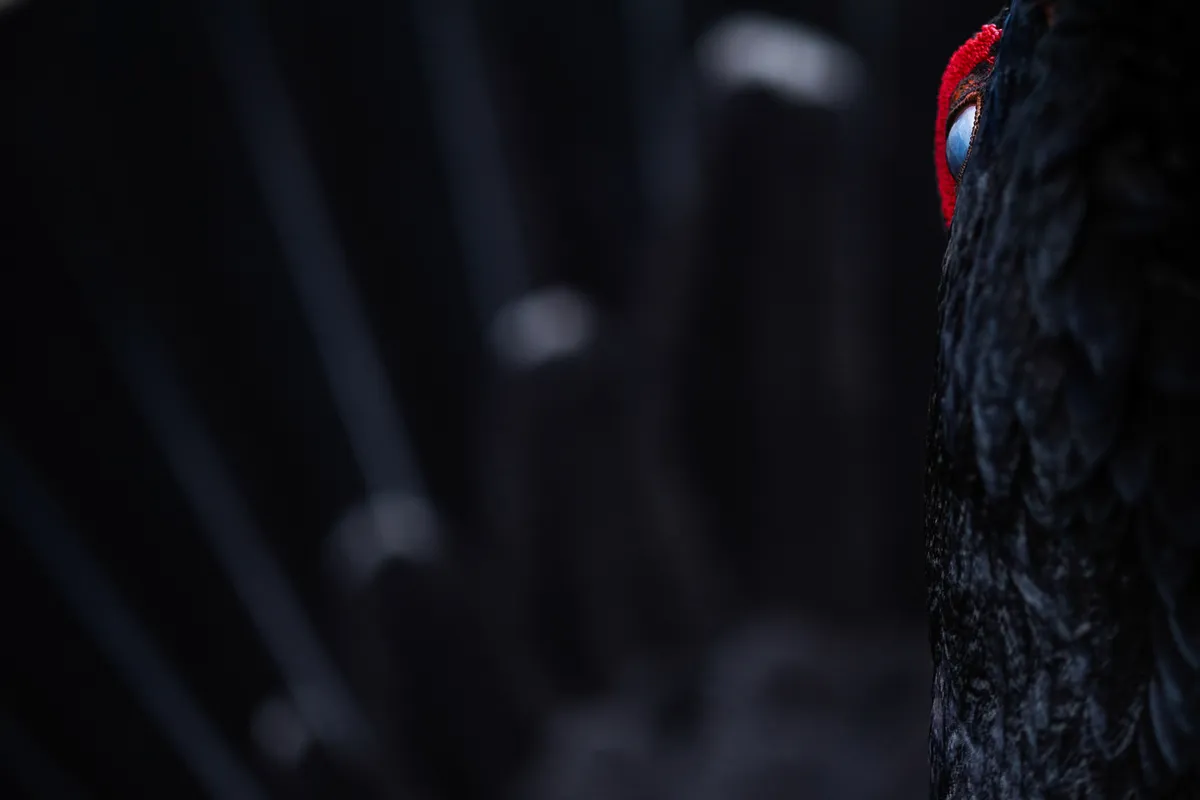
This seemingly fearless western capercaillie was approaching people during lekking time and displaying his beautiful feathers and form. He wasn’t aggressive and seemed calm even while people looked on.
As I knew that he resided in a forest near Stockholm, I took my macro lens with me to achieve this tight framing with the background created by his tail feathers. The nictitating membrane was a nice bonus.
Canon EOS-1D X Mark II with Canon 100mm f/2.8 Macro lens. Focal length 100mm; 1/500 second; f/2.8; ISO 250.
Bronze Award winner
Beads of Diamonds, by Sue Dougherty (USA).
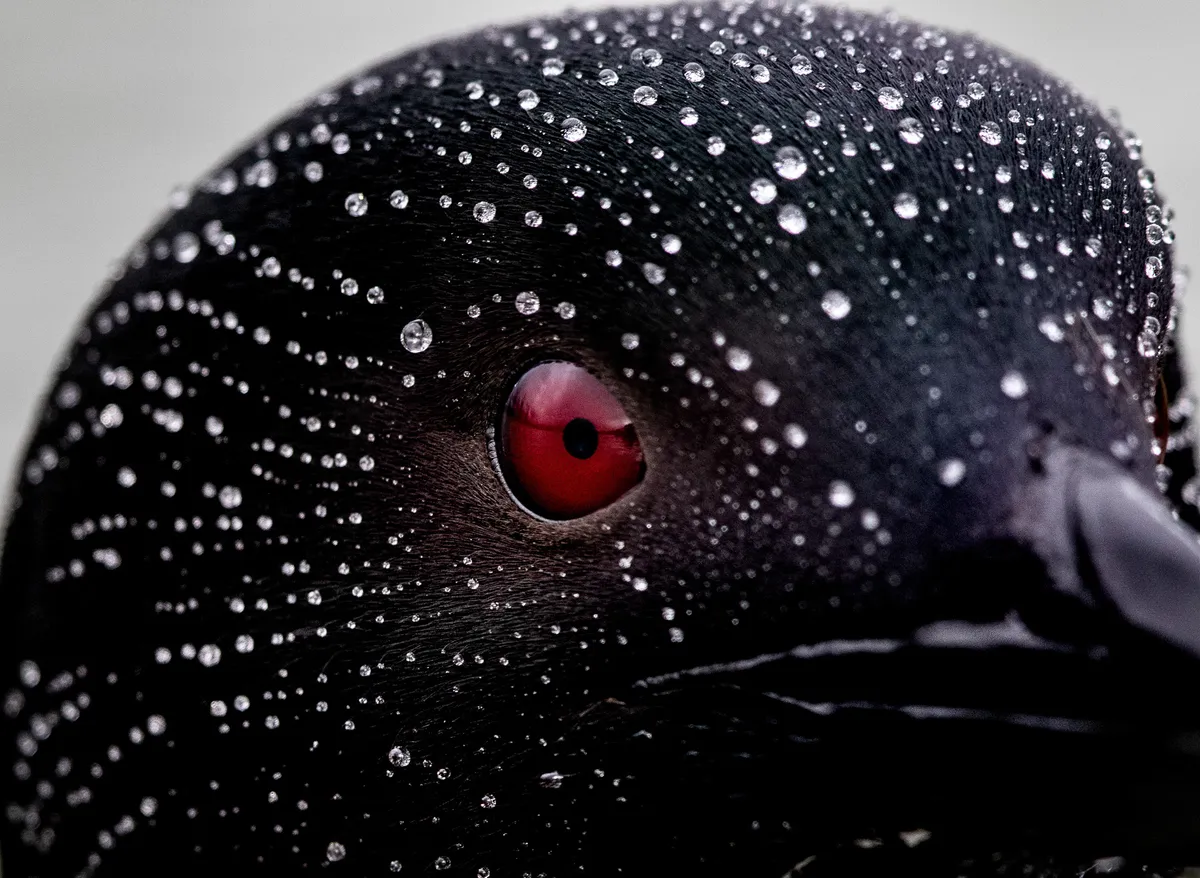
I spent some time in the Cariboo region of British Columbia photographing a very accommodating family of common loons (or great northern divers as they are known in Europe). Using a boat with low sides and an electric motor, I was able to observe and photograph the birds without disrupting or affecting their behaviour.
As I floated in silence, I watched the parent divers feed leeches and tiny fish to their chick – just days old – and they were unconcerned by my presence. In fact, the adults actually approached the boat and made repeated dives under and around it. I was able to capture the moment this one surfaced with perfect hydrodynamic lines of water droplets adorning its head from beak to neck.
They looked like glimmering beads of diamonds framing its ruby-red eye. Then, when I looked closely, I noted that the reflection in its eye was a ruby mirror of the trees on the lake shoreline.
Canon EOS 7D Mark II with Canon 500mm f/4 II lens and 1.4Å~ teleconverter. Focal length 700mm; 1/640 second; f/6.3; ISO 1,000.
Category: Best Portrait
Gold Award winner
Strut Performer, by Ly Dang (USA).
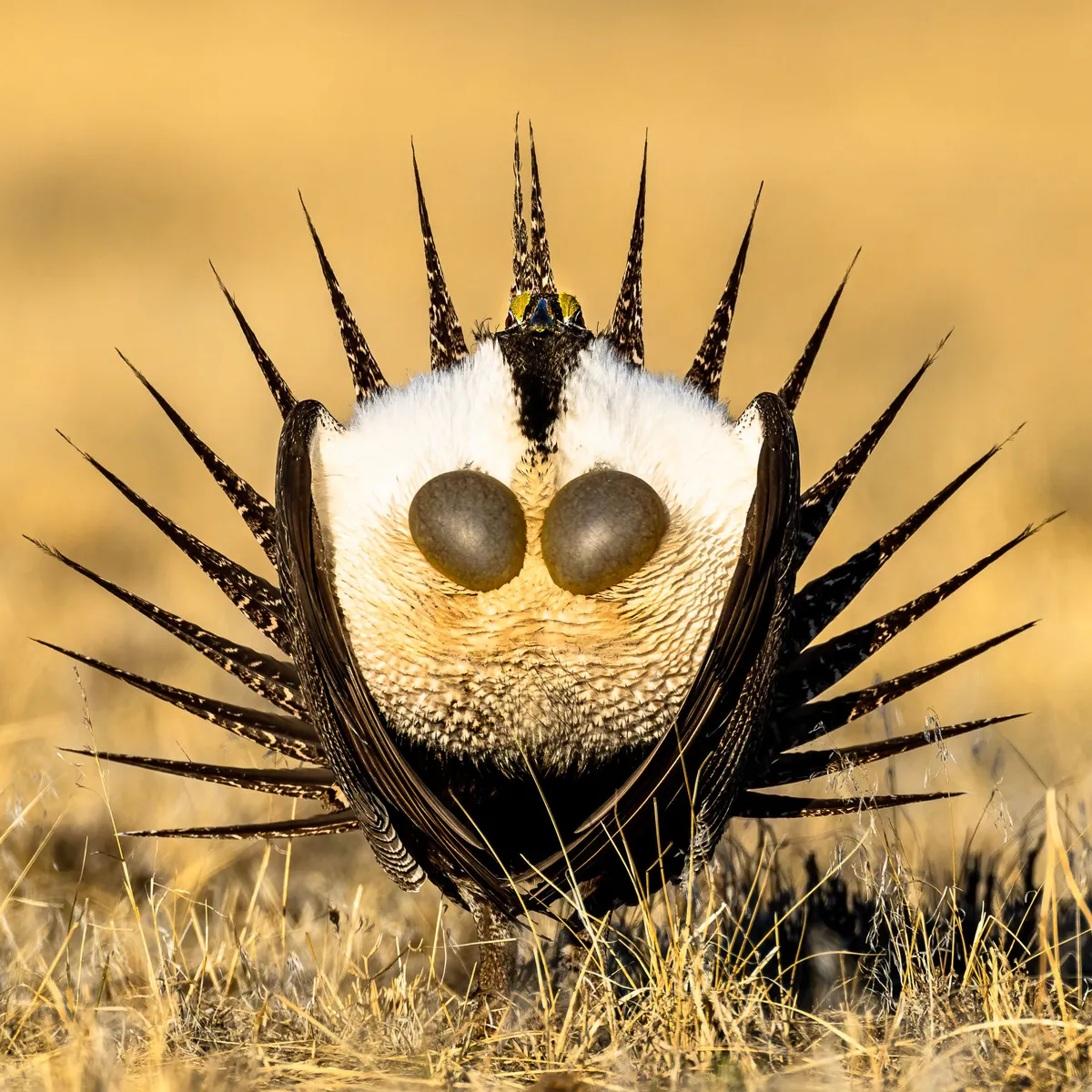
You know that springtime has arrived on the prairies of the Great Basin of the American West when the sage grouse gather at their leks. On these traditional display grounds, males of this Near Threatened species perform their strutting displays in the hope of winning the right to mate.
This behaviour is for the benefit of the females, which judge the talent show and select the best genes to pass on to the next generation. I arrived at the lek more than an hour before the birds so I could set up my hide without causing disturbance. Similarly, with the best interests of the birds at heart, I packed up the hide only when the last bird had left the area.
In previous years I had tried to capture this type of portrait shot but had been unsuccessful. However, on this particular morning my luck changed when this bird wandered close to my hide in full display. The photograph was taken without using baiting, calls, lures or unethical practices of any kind.
Sony A1 with Sony 600mm f/4 GM lens and 1.4x teleconverter. Focal length 840mm;
Silver Award winner
Puffin Love, by Brad James (Canada).
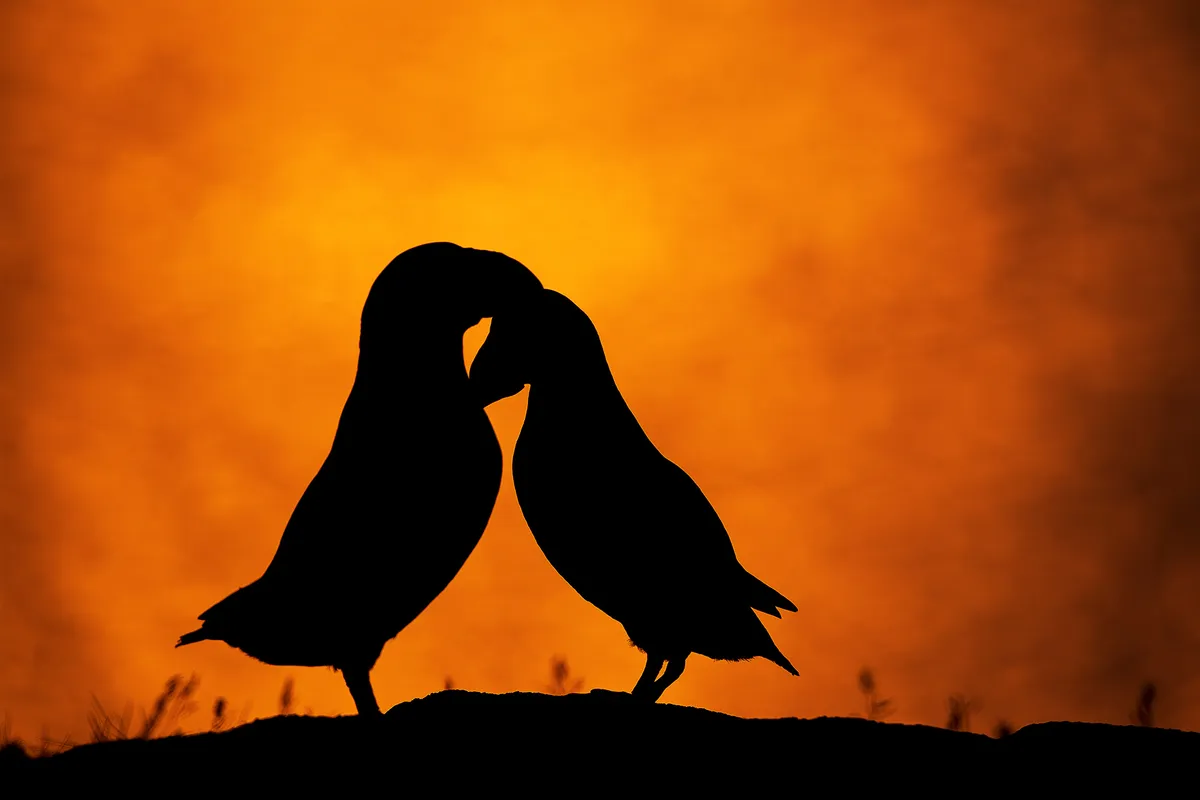
As the morning sun glistens over the surface of the ocean below, a pair of Atlantic puffins beautifully stationed on a dramatic cliff edge reinforce the intimate bond that exists between them.
Because of the intensity and sheer beauty of the colours being reflected off the sea, I decided to expose for the setting rather than the birds to create a silhouette of the puffins as they came together. This image perfectly captures the moment.
Nikon D850 with Nikon 500mm f/4 lens. Focal length 500mm; 1/1,250 second; f/5.6; ISO 64.
Bronze Award winner
The Doting Couple, by Richard Flack (South Africa).
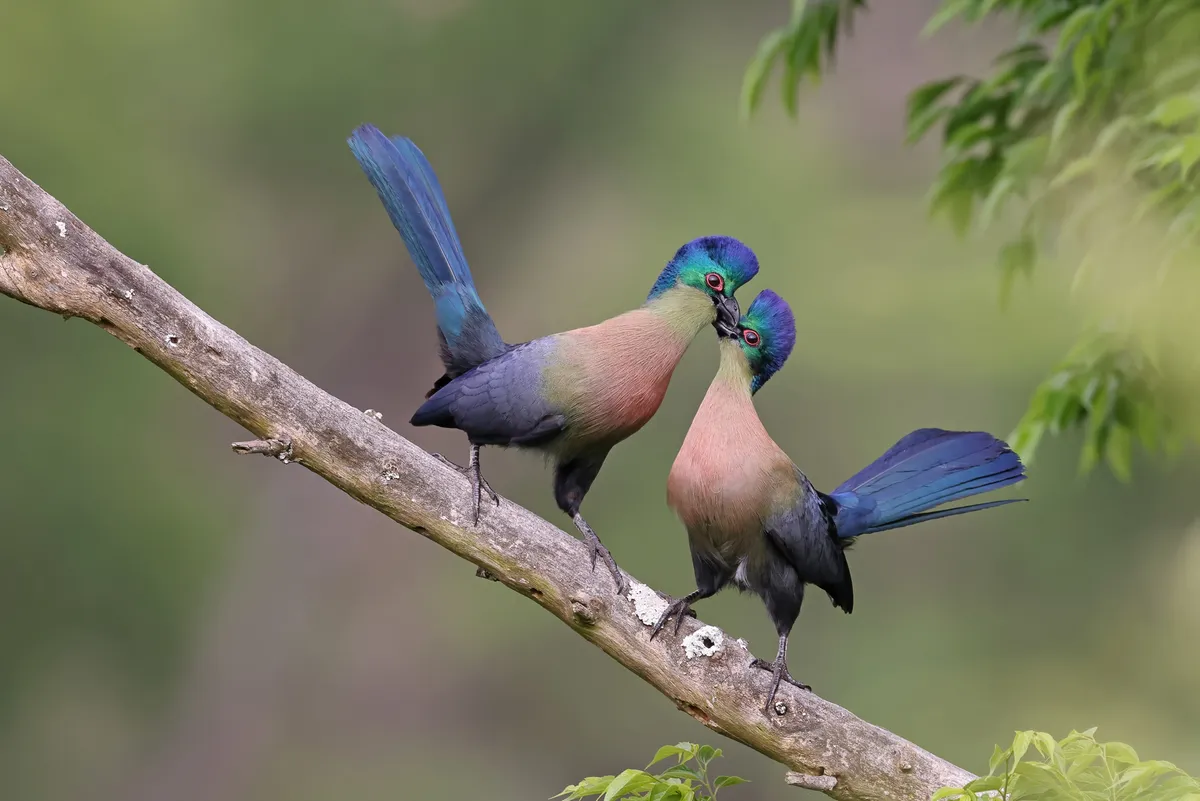
I have seen purple-crested turacos on hundreds of occasions and have always tried to take special photographs of them. They are such iconic African birds and are sought-after subjects. Unfortunately, they are shy characters and tend to avoid camera lenses.
However, while birding in a small conservancy in the Lower Mpushini area near Pietermaritzburg my luck with them changed completely. Seemingly out of nowhere, this exquisite pair flew out from thick cover and landed a few metres in front of me while I was searching for African emerald cuckoos (Chrysococcyx cupreus) in the canopy.
The turaco pair seemed much more interested in each other than in me, which allowed for some unbelievable photographic moments. All in all, it was a dream encounter and I felt privileged to share such an intimate moment with them.
Canon R5 with Canon 600mm f/4 III lens. Focal length 600mm; 1/2,500 second; f/6.3; ISO 2,000.
Category: Bird Behaviour
Gold Award winner
Duelling on the Lek, by Peter Ismert (USA).
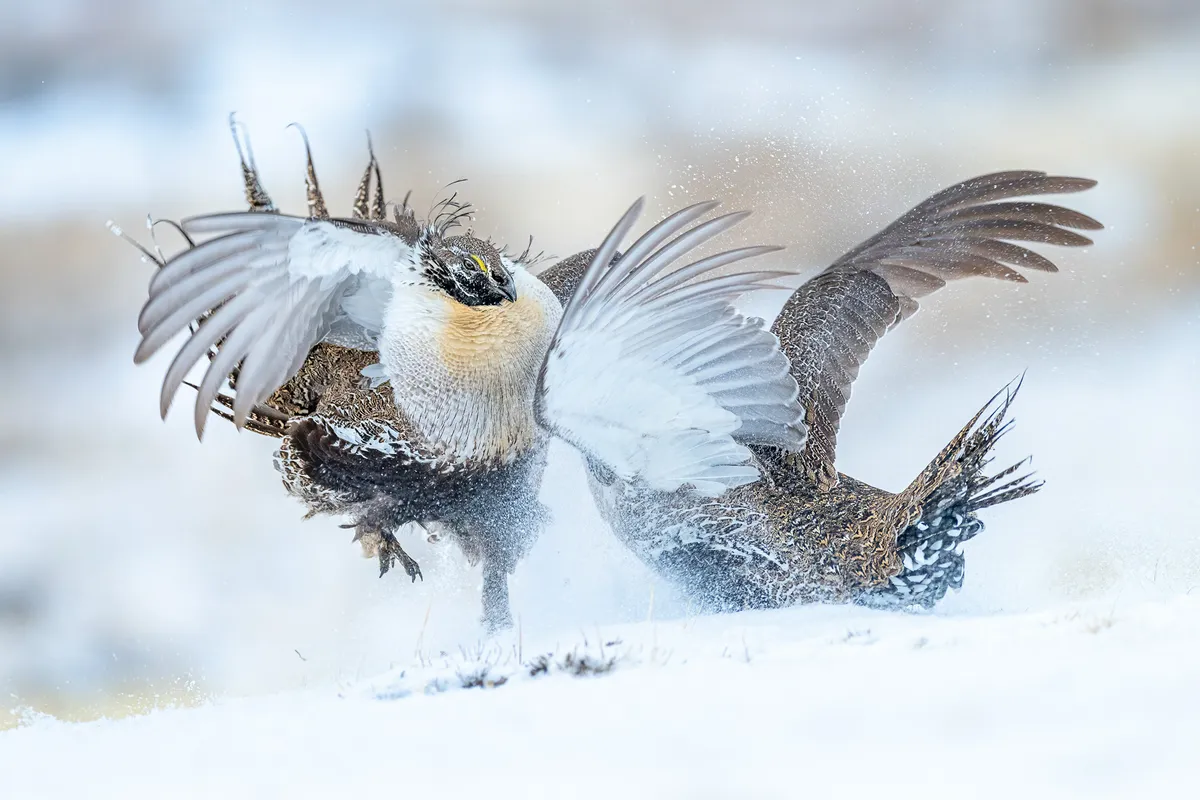
During the spring breeding season, male sage grouse gather on traditional lekking sites and often engage in short but violent fights. They have an elaborate display designed to attract and impress females and show their superiority; inevitably this leads to rivalry between males and challenges on the lek.
I set up my ground hide a safe distance from the lek a couple of days before the photo shoot. I entered my hide in the middle of the night, trying to sleep as best I could before the early-morning hours. At first light I awoke to booming sounds made by the male grouse, and the sight of their unusual display and this particular battle. No bait or calls were used.
Nikon D850 with Sigma 500mm f/4 lens. Focal length 500mm; 1/2,500 second; f/4; ISO 1,250.
Silver Award winner
Guillemot Swimmers, by Henley Spiers (UK).
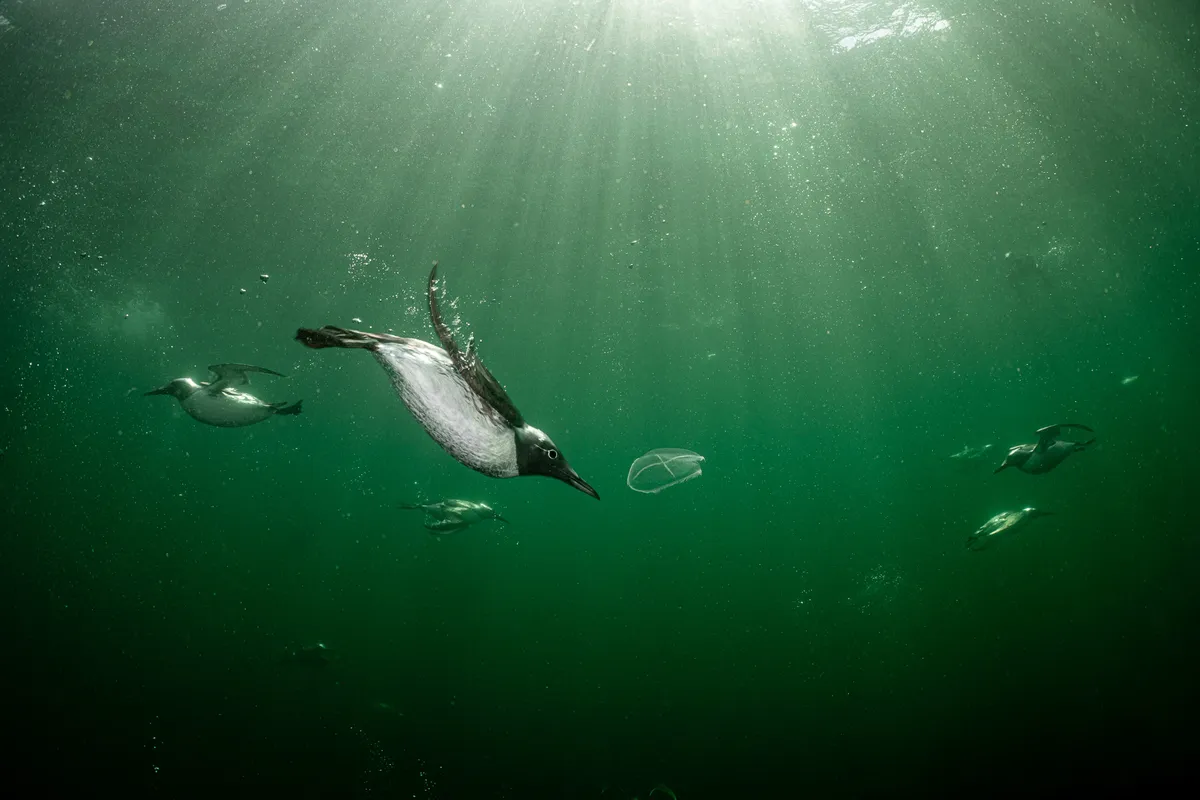
Common guillemots (common murres) are incredible freedivers – so good, in fact, that studies have shown that of all flying birds, this humble species is the most efficient swimmer. It is bested in the water only by penguins, with which it shares similar stylistic traits. The difference, of course, is that penguins – perhaps descended from the same auk family as common guillemots – sacrificed their ability to fly as they adapted to an aquatic existence.
Nikon D850 with Nikon 28–70mm f/3.5–4.5 lens. Focal length 28mm; 1/250 second; f/13; ISO 200.
Bronze Award winner
Waxwing Silhouette, by Simon d'Entremont (Canada).
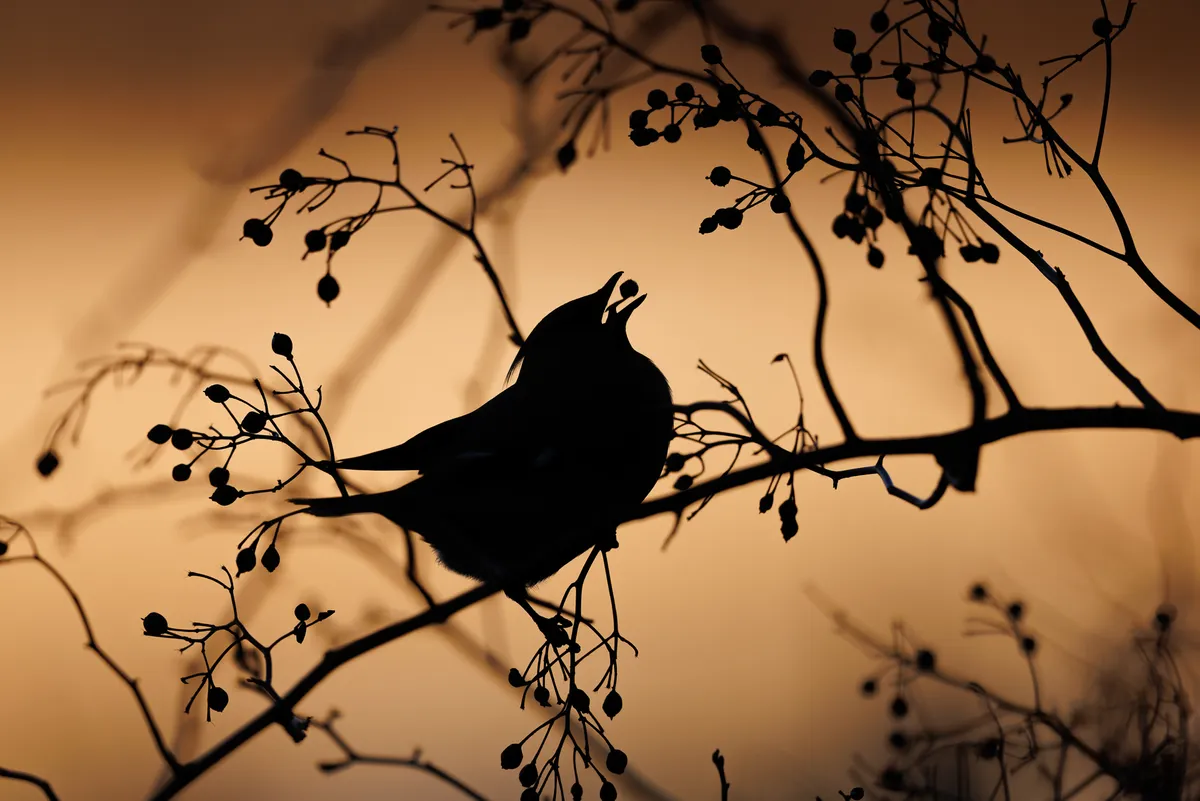
This was an amazing experience for me. A flock of more than 100 Bohemian waxwings descended onto these berry bushes, devouring them right in front of me. Not only are they beautiful birds, but the action of them picking berries and often flipping them in the air to eat them is impressive and very photogenic.
The challenge is that when they are in the middle of the berry bushes, the photo is just a tangle of branches with the birds hidden inside. The sweet spot is when the birds are on the edges of the bushes, where the background can be cleaner. In this photo, the birds were also in the shade and the background was in the sun, my favourite effect. I underexposed the shot to create this silhouette effect.
Canon R5 with Canon 500mm f/4 II lens. Focal length 500mm; 1/1,600 second; f/4.5; ISO 160.
Category: Birds in Flight
Gold Award winner
Silo Mural, by Raoul Slater (Australia).
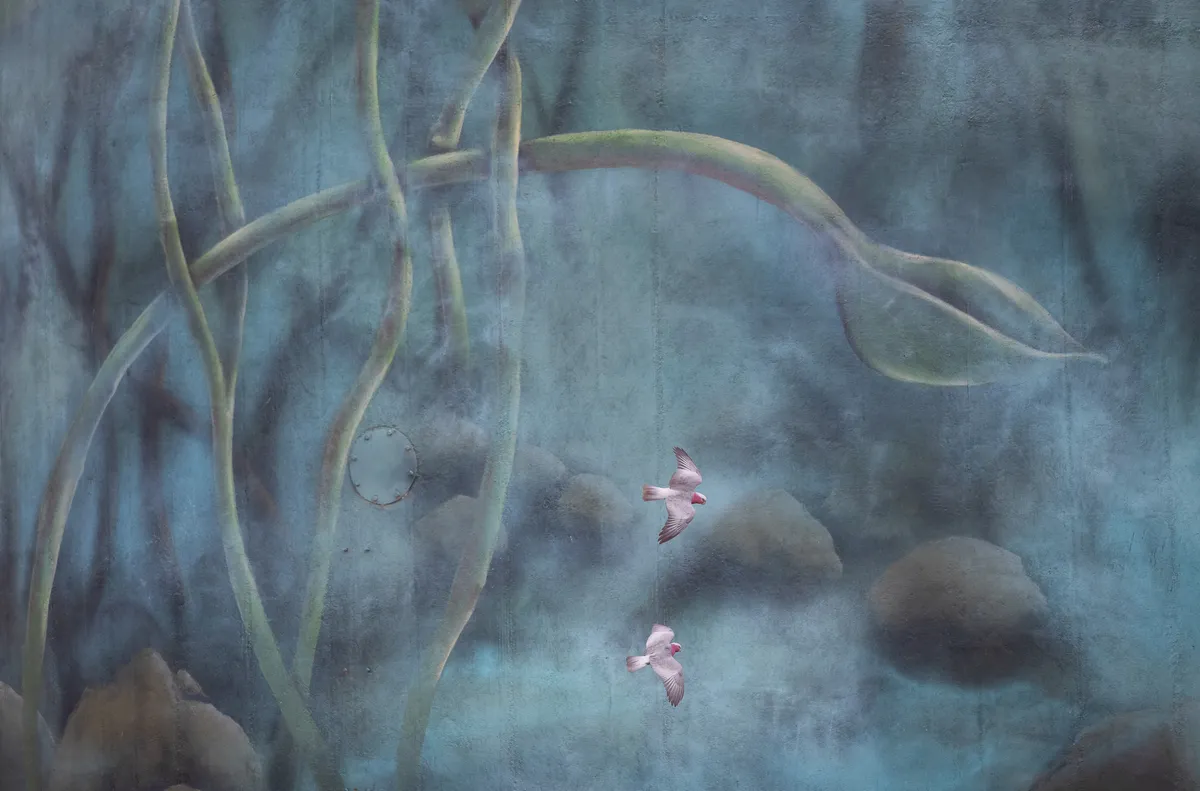
Large areas of Australia are flat, dry and given over to wheat farming. Towns can consist of as little as a truck stop and a collection of grain silos. In some locations, these silos have become popular palettes for enormous murals, drawing tourists into otherwise desolate areas.
I passed through Yelarbon and stopped for two hours to photograph the galahs that are attracted to spilt grain. The results were so pleasing and surreal that I made the seven-hour trip on a subsequent weekend to have another go, only to find that a mouse plague had moved in and the silos were being fumigated – no galahs. (Mural: Brightsiders.)
Canon R5 with Canon 300mm f/2.8 lens. Focal length 300mm; 1/8,000 second; f/3.5; ISO 1,600.
Silver Award winner
Starling at Night, by Mark Williams (UK).
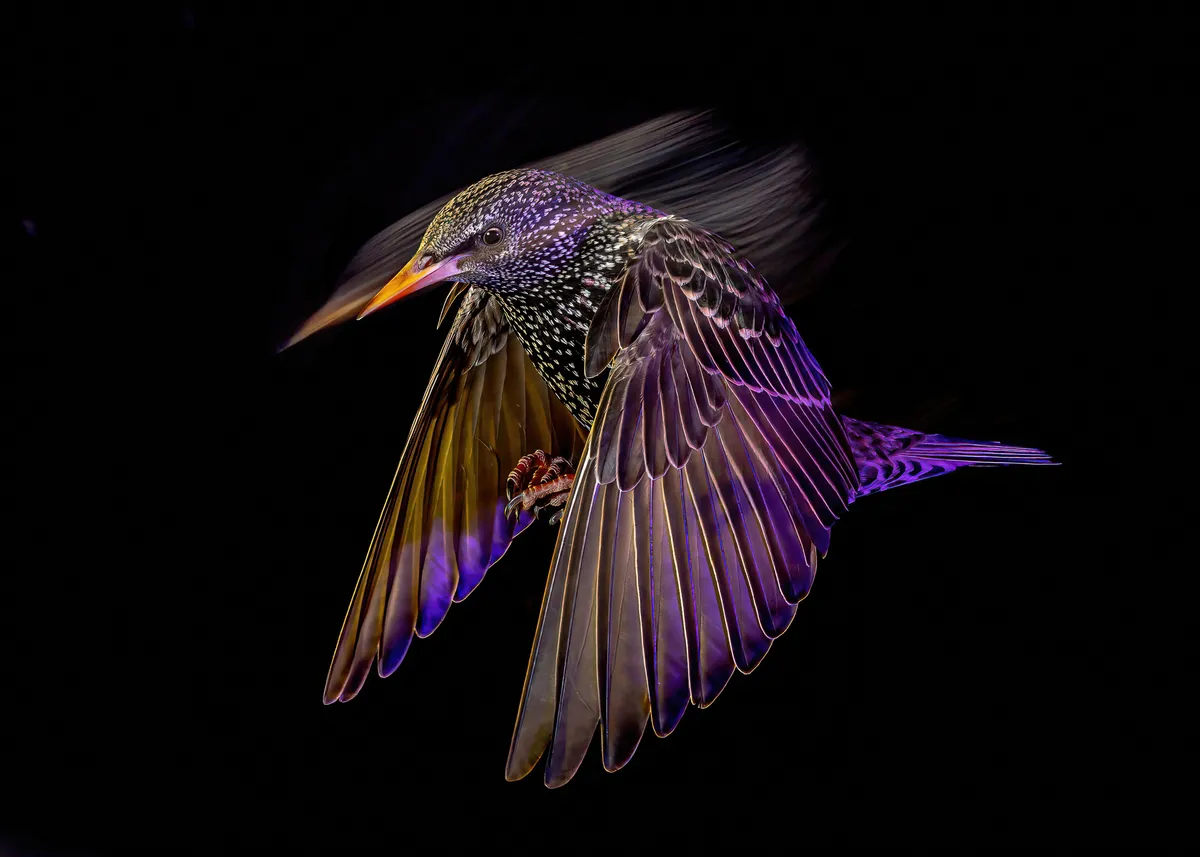
This image was taken using flash, with the camera in rear curtain synch mode. To attract the common starling, I placed some sunflower seeds in a feeder, and as the bird came towards the feeder, I timed the shot to capture its descent.
Timing was critical, as was the need to balance the flash with the ambient light so you could see the trail of the starling while the flash ‘froze’ the bird in flight. The coloured gels on the flash heads add to the image, giving it a feeling that the bird is lurking in the shadow of the night.
Canon EOS 5D Mark III with Canon 100–400mm f/4.5–5.6 lens and flash. Focal length 200mm; 1/15 second; f/16; ISO 200.
Bronze Award winner
Schalow’s Turaco, by Aaron Baggenstos (USA).
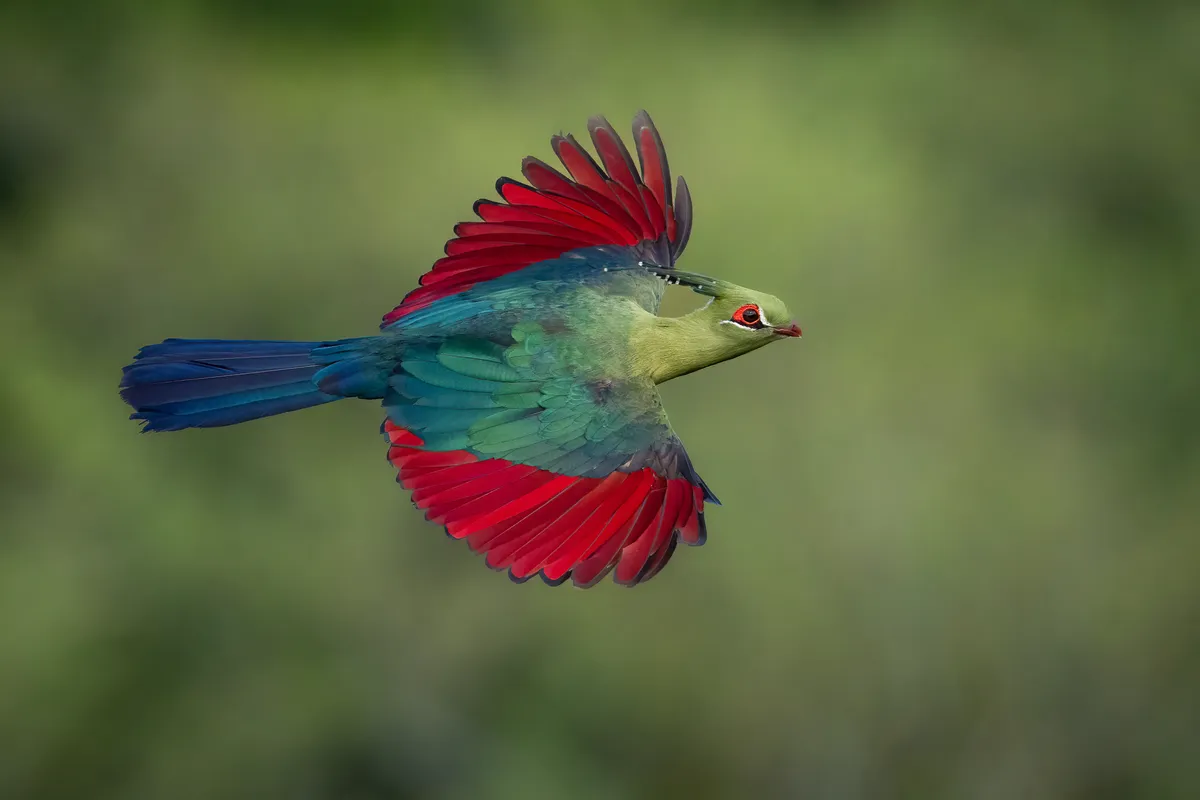
In more than a decade of wildlife photography I’ve never seen a decent photo of a Schalow’s turaco in flight. Google it for yourself if you don’t believe me. These stunningly dressed birds spend most of their time high in the dark jungle canopy and are extremely fast in flight – I think of them as ‘bullet’ birds.
This combination makes them almost impossible to photograph in flight. You can imagine my excitement when I found out a few birds were flying across the river in front of my safari tent each morning at eye level! My heart pounded as I stood on the bank waiting patiently as they called out from the tree tops. I just knew this was the opportunity of a lifetime.
The river setting was a unique window of opportunity that provided just a split second to acquire focus. A green bird on a green background is a nightmare for an autofocus system, but I knew my new camera’s tracking system, and a decade of photographing birds in flight gave me a fighting chance.
On my last morning in camp the diffused overcast light was just beautiful. This is it, I thought. The colour of the birds’ vibrant red wings popped out from the tree tops at a distance. Suddenly, out of the corner of my eye I saw this individual emerging from the canopy like a bullet and coming diagonally straight towards me. I panned, my thumb glued to the back button as the camera tried to grab initial focus. Nothing… then bam! I couldn’t believe it.
I acquired focus just before the bird flew out the edge of the frame. But was it sharp? Reviewing the image on the back of the camera, my face lit up. This image captured the moment, and what a remarkably beautiful avian creature it was. It was a true gem to witness and I am thrilled to share the photographic outcome with the rest of the world.
Sony A1 with Sony 200–600mm f/5.6–6.3 G lens. Focal length 437mm; 1/3,200 second; f/6.3; ISO 3,200.
Category: Black and White
Gold Award winner
Between Two Worlds, by Henley Spiers (UK).
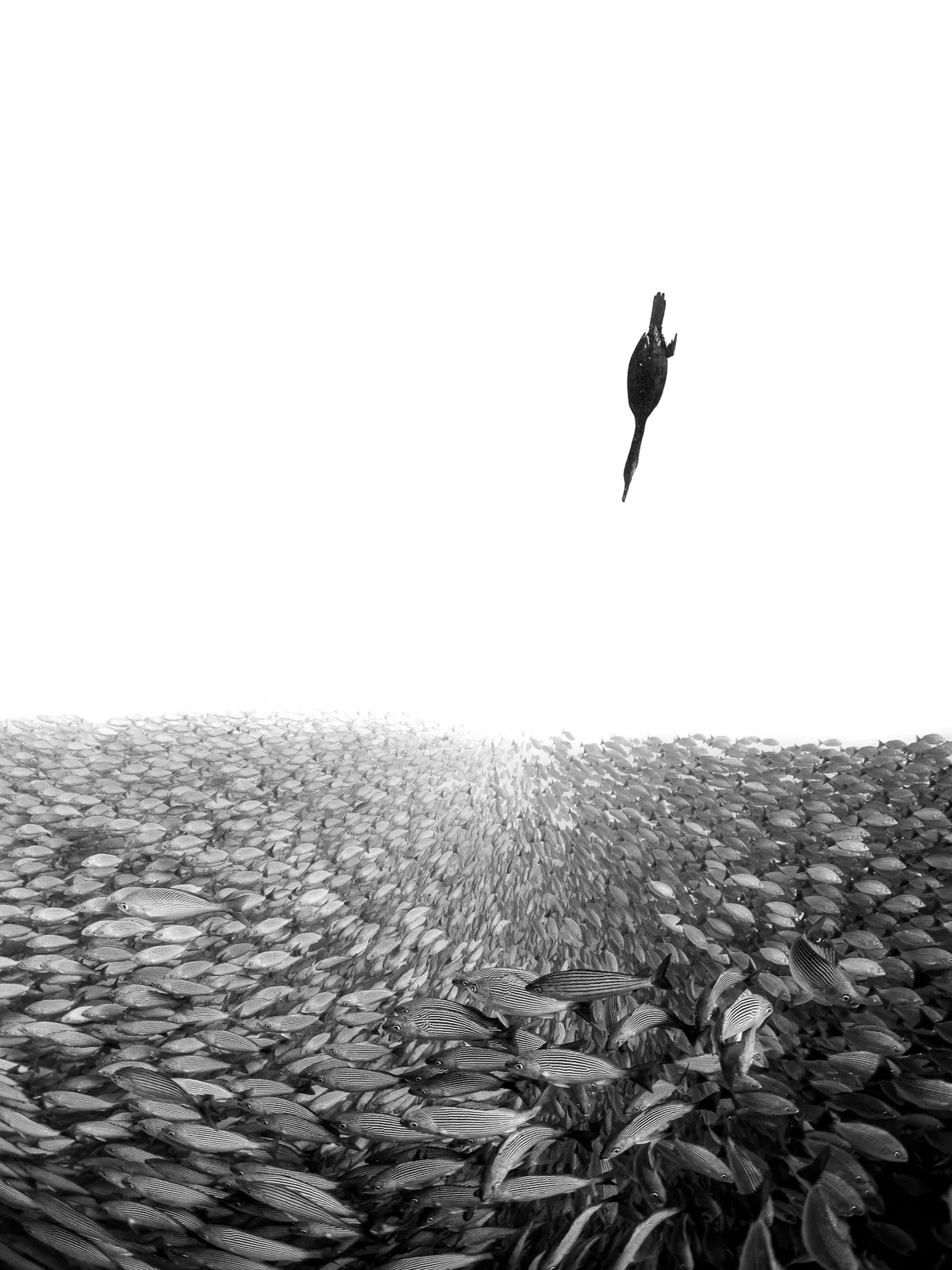
Ten metres down, I found myself hovering between two worlds. Below, an enormous school of fish covered the bottom as far as I could see. Above, a single double-crested cormorant patrolled the surface, catching its breath and peering down at a potential underwater feast.
The cormorant, better designed for swimming than flying, would dive down at speed, aggressively pursuing the fish. The school would move in unison to escape the bird’s sharp beak, making it difficult to isolate a single target. More often than not, the bird returned to the surface empty-billed, and peace would momentarily be restored.
I would squint up at the sunny surface, trying to keep track of the predator and anticipate its next underwater raid. This image captures the hostile black silhouette of the cormorant as it dives down onto its prey, which for a brief moment remain unaware of the danger above.
Nikon D850 with Nikon 28–70mm f/3.5–4.5 lens. Focal length 28mm; 1/500 second; f/8; ISO 500.
Silver Award winner
The Guardian of Mordor, by Pawel Smolik (Poland).
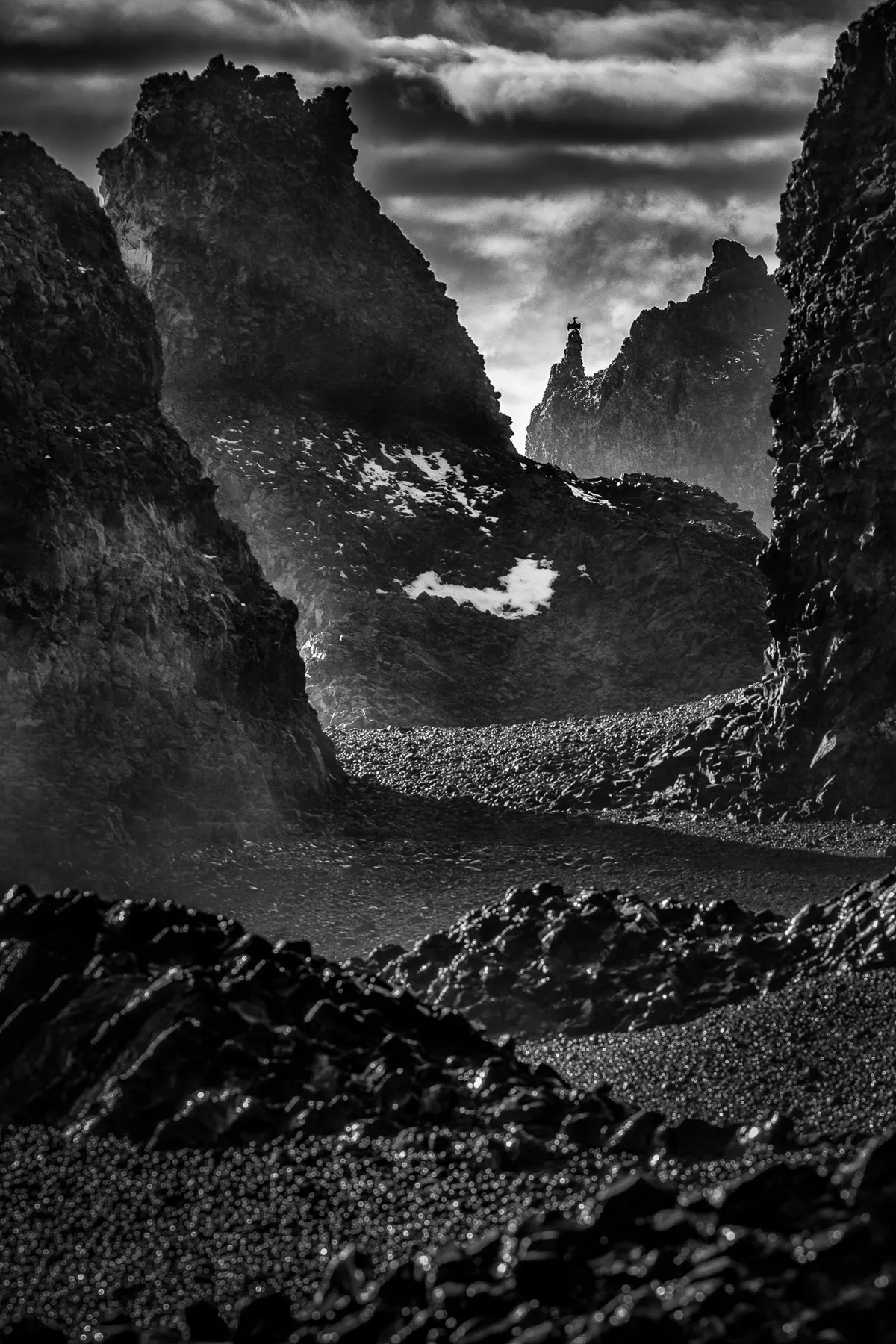
The photo was taken on the black lava beach of Skarðsvík on the west coast of Iceland. While walking there I noticed that, after diving in the ocean, one of the area’s great cormorants would sit on a sharp, pointed ridge to dry its wings. The waves, which were unusually large that day, were crashing on nearby rocks, creating a floating mist of water.
The sight of this cormorant with its black wings spread, combined with the aura of the place and the colour of the sand and rocks – all shades of black – reminded me of The Lord of the Rings movies. For this reason, and to emphasise the ominous sense of foreboding, I decided to present the photo in black and white.
Canon EOS 5D Mark IV with Canon 100–400mm f/4.5–5.6 II lens. Focal length 188mm; 1/500 second; f/8; ISO 100.
Bronze Award winner
Winter Swans, by Tomasz Sczansny (Poland).
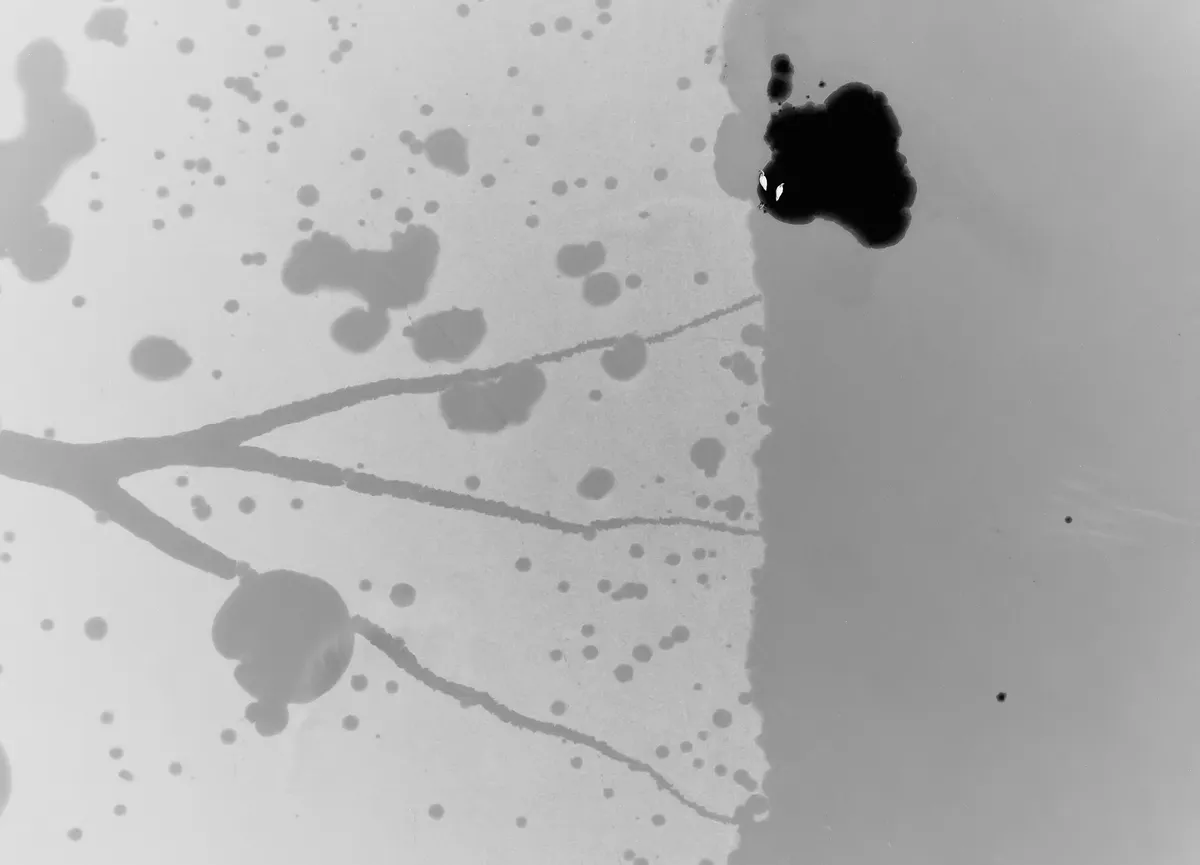
I like looking at the world from an alternative perspective and, when I do, common species and familiar landscapes sometimes take on an otherworldly appearance and become extremely interesting. I encounter mute swans regularly on this lake, but this was the first time I had photographed them using a drone. I took this image not far from my home, while the lake was frozen.
The ice paints the landscape with beautiful shapes and the swans add context, the whole scene working particularly well in black and white. Such a situation was probably a one-off and will never be repeated.
DJI Phantom 4. Focal length 3.6mm; 1/100 second; f/2.8; ISO 183.
Category: Creative Imagery
Gold Award winner
Van Gogh’s Storks, by Petro Katerynych (Ukraine).
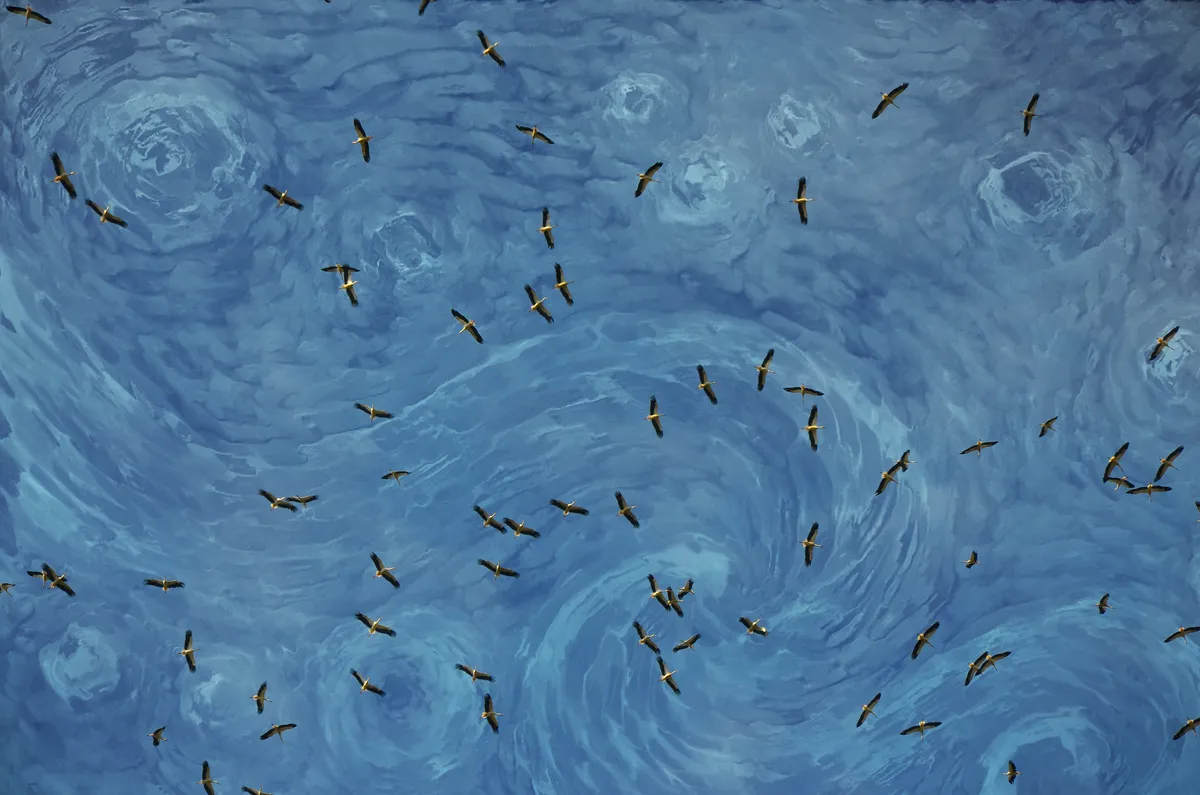
In Ukrainian mythology white storks symbolise faithfulness and strength of spirit. It is hard to imagine a Ukrainian village without a stork’s nest. Everywhere, from Polesia to Slobozhanshchyna, White Storks are seen as a symbol of love for their motherland. When spring arrives and storks return home, Ukrainians young and old go out into the streets, greet the birds’ arrival and sing traditional songs called Vesnyanki in celebration.
Ukrainians cherish spring, which brings prosperity and hope, and we feel that happiness will undoubtedly bless any house where a stork settles and decides to nest. Storks also set a good example and serve to remind Ukrainians how important it is to love our homeland. They fly thousands of kilometres to warmer lands when there is a bitter winter. But they always come back, overcoming all the hardships that beset them on their journey. We believe that love for their native land gives the storks the strength to survive and return home.
Ukrainians don’t traditionally give birds and animals human names. However, an exception is made with white storks, which are addressed as if they were people. My fellow Ukrainians are facing a similarly challenging task right now – once again they must defend their native nests, while some are forced to rush like storks in the direction of the sun. Many of us will fall, but I hope that spring is ahead of us. I believe that most of us will live to see the return of white storks circling overhead in the peaceful skies of a free Ukraine. Then we will all rally together, and sing Vesnyanki once more.
Nikon D5100 with Nikon 18–105mm f/3.5–5.6 lens. Focal length 105mm; 1/320 second; f/9; ISO 100.
Silver Award winner
Fishy Business, by Janine Lee (UK).
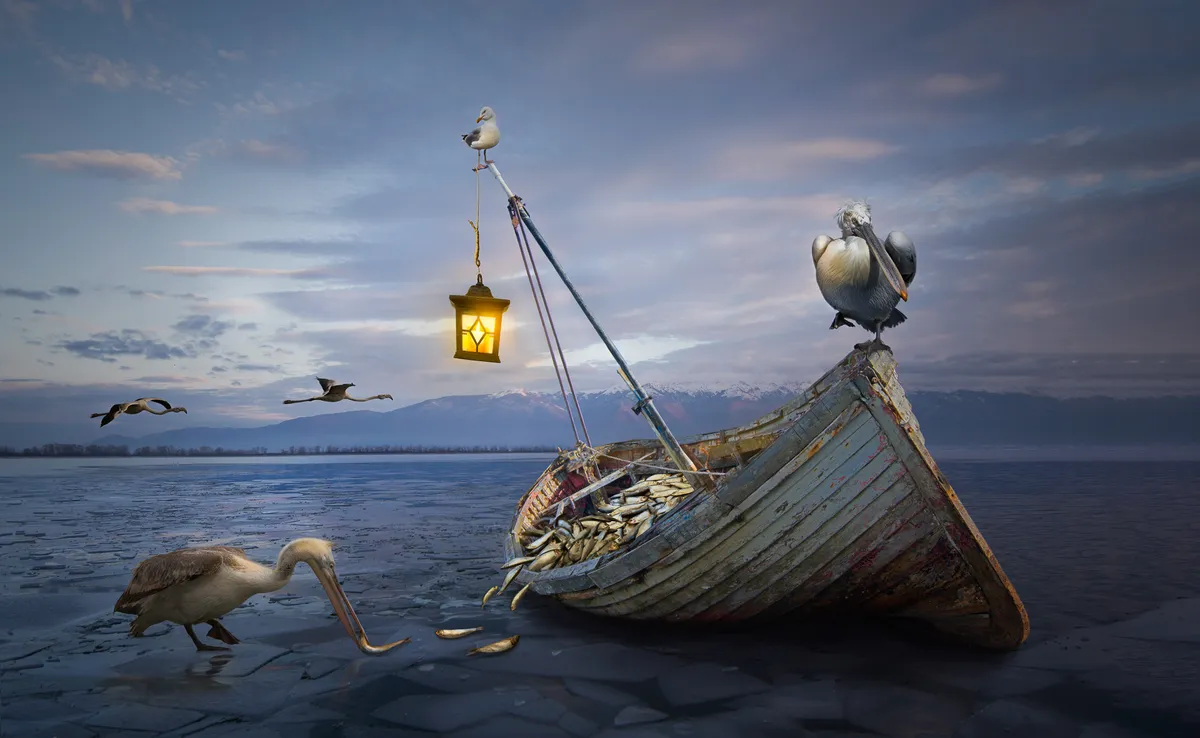
I’m not really sure where the idea for this image came from; I just knew I wanted to create a light hearted picture of birds stealing the fisherman’s catch. The scenery, Dalmatian pelicans and greater flamingos were at beautiful Lake Kerkini in Greece, and the old boat was one I spotted on the Norfolk coastline. I bought fish from my local market and photographed them at home, along with an old lantern from my garden. I used my editing software to bring everything together and balance the light, shadows and colour tones.
Nikon D7200 with Tokina 11–16mm f/2.8 lens. Focal length 16mm; 1/1,000 second; f/2.8; ISO 200. Composite.
Bronze Award winner
Sandhill Crane Flight Team Air Show, by Wei Lian (USA).
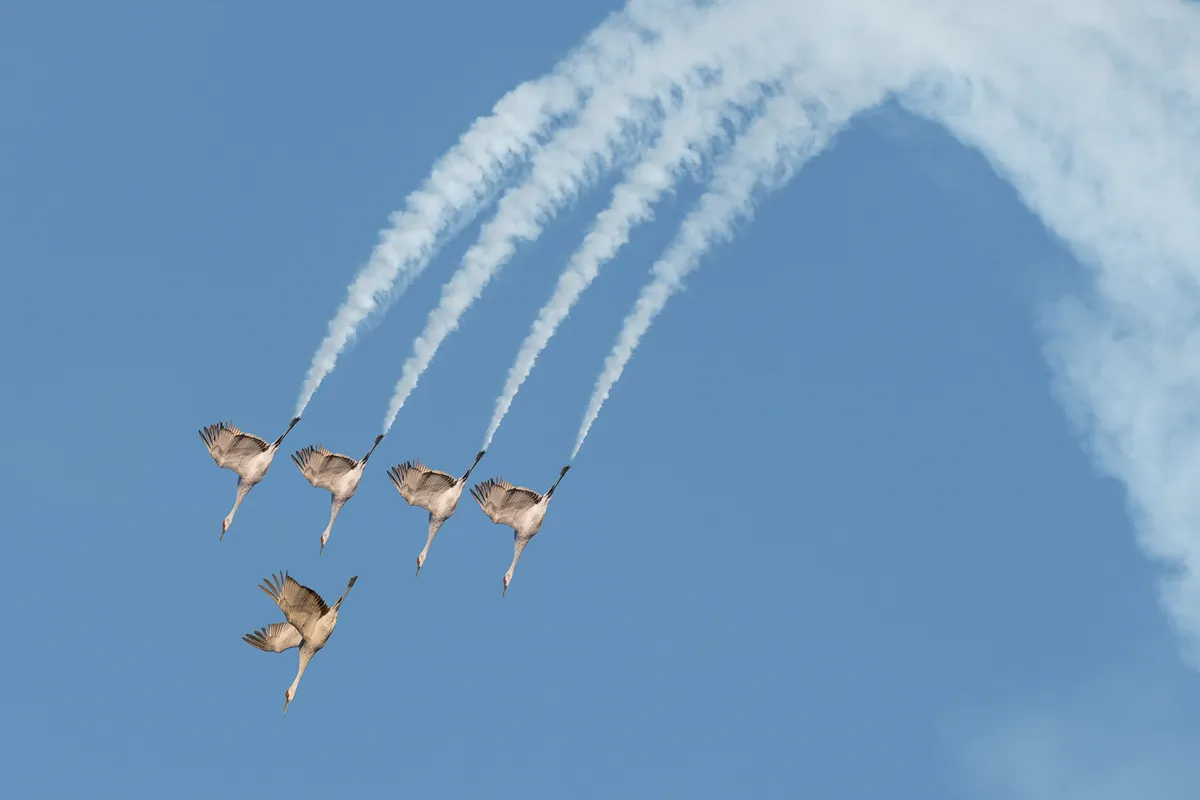
Last October, I went to San Francisco in California to watch the spectacle of the annual US Navy Blue Angels military air show. The performance was wonderful, and I took a lot of photos. Inspired by the aerobatic skills of the Blue Angels, I decided to incorporate a formation of sandhill cranes into the scene, and created this image using several pictures that I blended and combined.
Nikon D850 with Nikon 80–400mm f/4.5–5.6 lens. Focal length 400mm; 1/3,200 second; f/9; ISO 720. Composite.
Category: Urban Birds
Gold Award winner
Over the City, by Ammar Alsayed Ahmed (UAE).
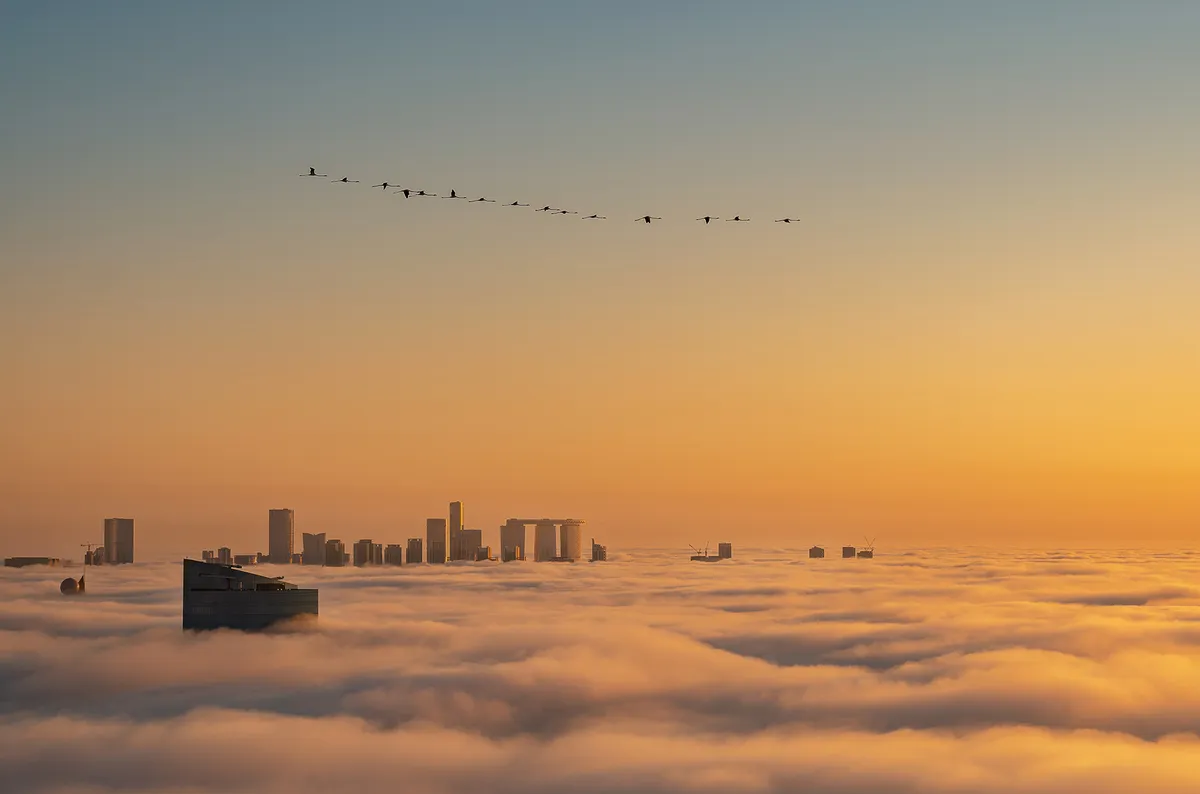
This image was taken from the rooftop of one of the towering skyscraper buildings that dominate the skyline of Abu Dhabi. It shows a line of greater flamingos flying on a morning when fog covered the city and the only signs of the urban landscape were the tops of the buildings emerging from the blanket of mist.
At the time it seemed a bit like a fantasy, a fleeting moment made surreal as the birds unexpectedly flew past. Fortunately, I was prepared for action and my zoom lens allowed me to frame the birds and capture the moment.
Nikon Z 6 II with Nikon 70–200mm f/2.8 lens. Focal length 71mm; 1/500 second; f/7.1; ISO 100.
Silver Award winner
Gonzo, by Laszlo Potozky (Romania).
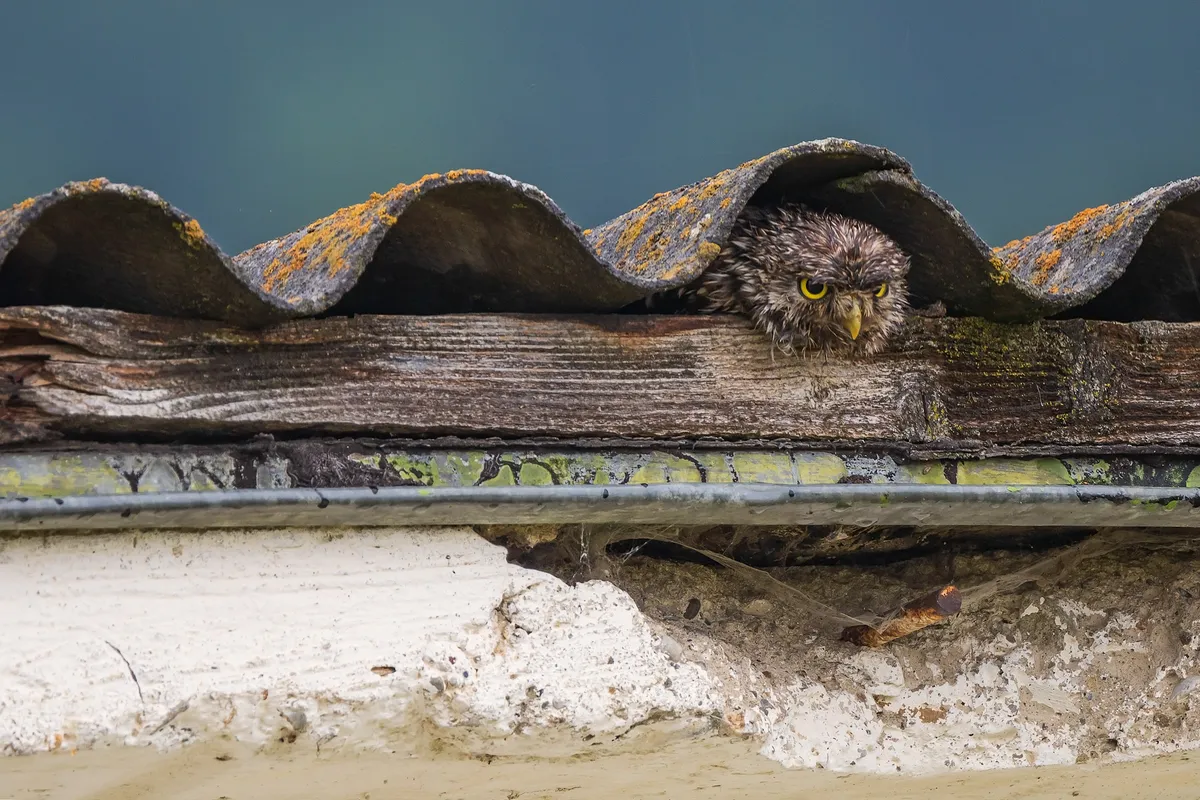
This image was taken in Transylvania in Romania, not far from one of my favourite Natura 2000 sites. Only rarely are there days when this highly respected protected area fails to deliver from a bird photography point of view. However, on such days I know I have a fall-back option, namely an abandoned building where Little Owls have nested for more than a decade.
Last year, on one of these Plan B days, I arrived at the building following heavy rain and discovered that the little owl family had grown: three chicks had hatched a few weeks previously. To my relief, I was ‘welcomed’ by the whole family, and while four of them were drying their feathers on the roof, one of the chicks was under it, posing in an odd way and with what looked like an air of resignation. To my eyes I could see a resemblance to Gonzo, the famous character from The Muppet Show.
Sony A7R IV with Sony 200–600mm f/5.6–6.3 G lens. Focal length 600mm; 1/60 second; f/6.3; ISO 400.
Bronze Award winner
The Owlet and the Dump, by Kerry Wu (USA).
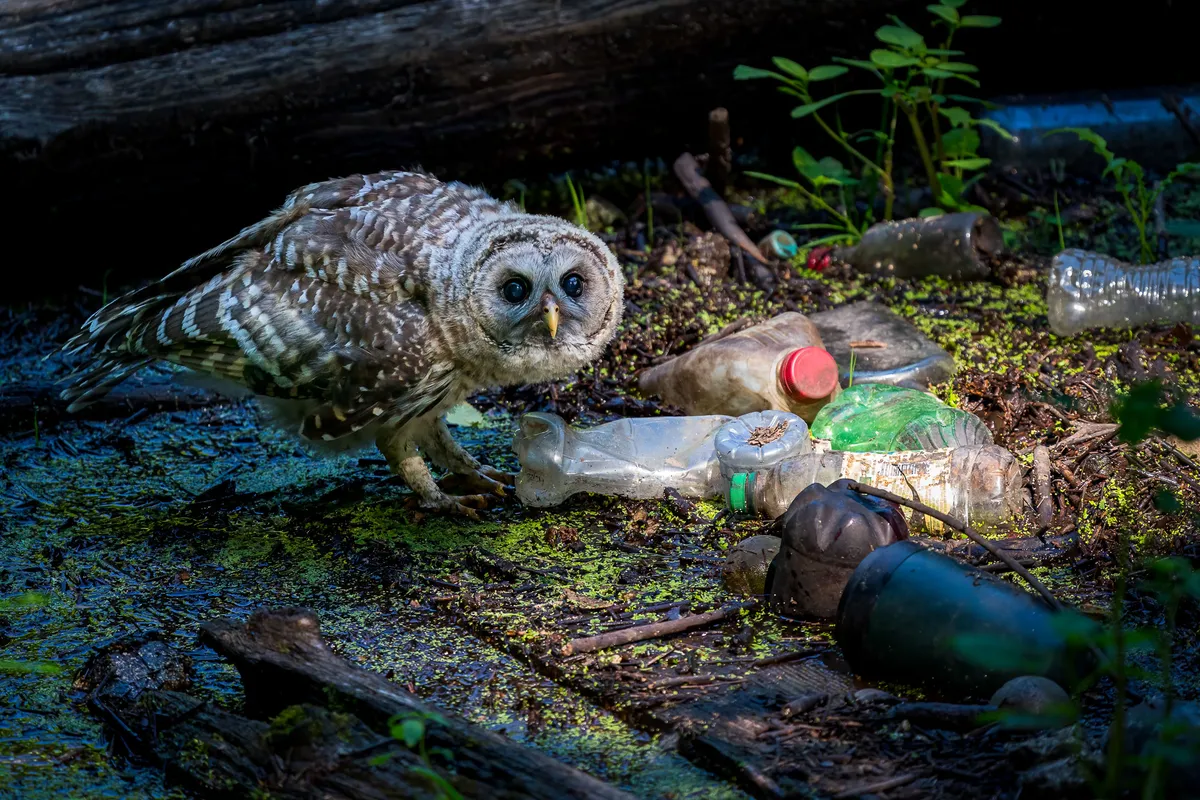
Bottles, glass, plastic, jugs, car tyres, derelict furniture. These discarded items are not what we usually think of as typical barred owl habitat. Nevertheless, this was exactly what one family was obliged to tolerate. The location is not a formal garbage dump as such, but rather a creek that runs through an urban park.
Above the ravine is a native forest that this owlet, its family and many other wild animals call home. The owlets bathe and play around the creek, which unfortunately is where rubbish is dumped and accumulates. While I was watching the scene, one of the owlets even picked up a large rusty screw and ‘played’ with it as if it were a twig.
At one point it looked right at me as if to say, ‘What have you done to my home?’ The ravine is, but shouldn’t be, a dumping ground and this scene broke my heart. Nature is not a landfill site. We can do better. We must do better.
Sony A9 II with Sony 200–600mm f/5.6–6.3 G lens. Focal length 559mm; 1/800 second; f/6.3; ISO 2,500.
Category: Young Bird Photographer of the Year, 14-17 years
Gold Award winner and overall Young Bird Photographer of the Year
Facing the Storm, by Levi Fitze, (Switzerland).

Last autumn I spent a week on the tiny North Sea island of Heligoland. The weather was quite bad and I didn’t see a single nice sunrise. However, the opportunity to observe all kind of shorebirds made up for the conditions. When I saw a group of dunlin struggling with a small sandstorm, I decided to risk my equipment and attempt to photograph them. I could really see on their faces how annoyed they were by the wind and sand flying everywhere. I sympathised with them.
Sony A7R IV with Sony 400mm f/2.8 GM lens. Focal length 400mm; 1/1,250 second; f/2.8; ISO 125.
Silver Award winner
Pied Avocet Chick, by Tamás Koncz-Bisztricz (Hungary).
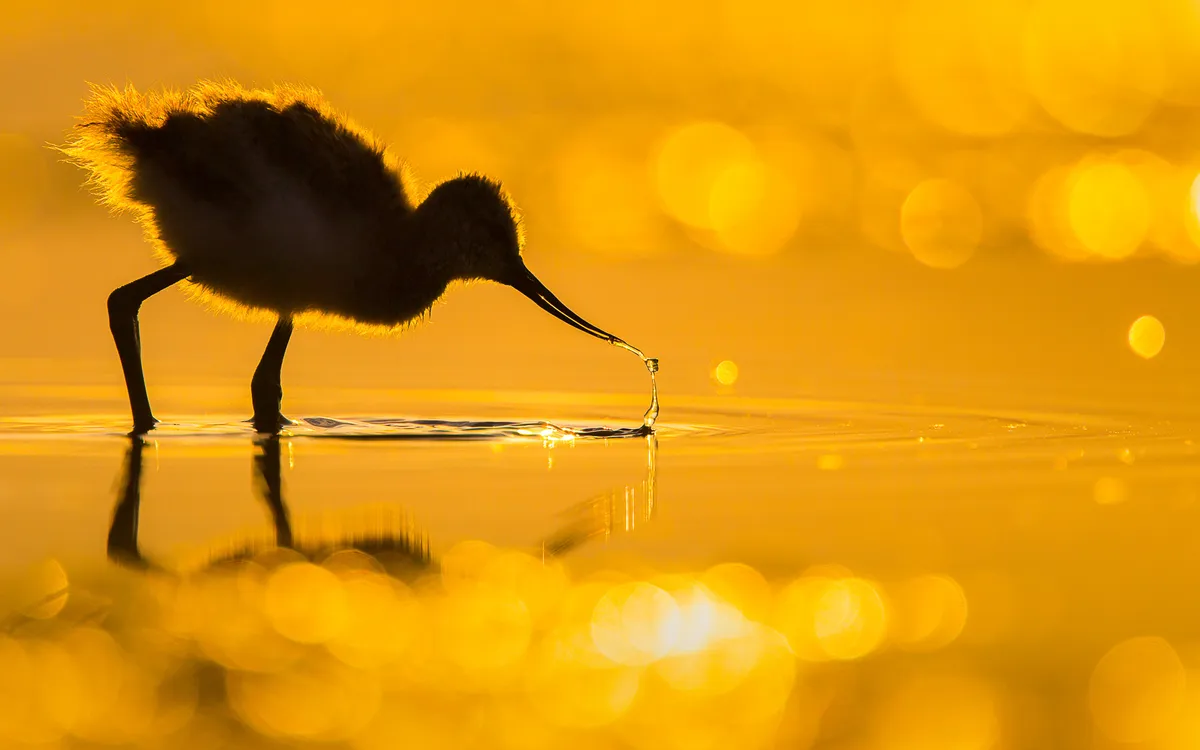
This photograph was taken in an area I have known for a long time – it is a soda lake called Nagyszéksós-tó, near the town of Mórahalom. Kinskunság National Park introduced water buffalos (Bubalus bubalis) at least ten years ago, and the beneficial outcome has been that the birdlife has become very rich and diverse.
Until now, I have photographed only adult birds at this location, but I managed to observe and photograph Pied Avocet chicks in early summer. After prolonged observation, I edged my way closer to the birds. The parent birds soon overcame any nervousness and soon got used to my presence; I was an insignificant addition to the nearby water buffalos, which dwarfed me. The chicks went about their business a few metres away from me, and fed and preened quite happily. I was lucky enough to be able to photograph this chick backlit, and as a result I took some really special images.
Canon EOS-1D X with Canon 400mm f/4 II lens and 1.4x teleconverter. Focal length 560mm; 1/3,200 second; f/5.6; ISO 100.
Bronze Award winner
Sunset, by Thamboon Uyyanonvara (Thailand).
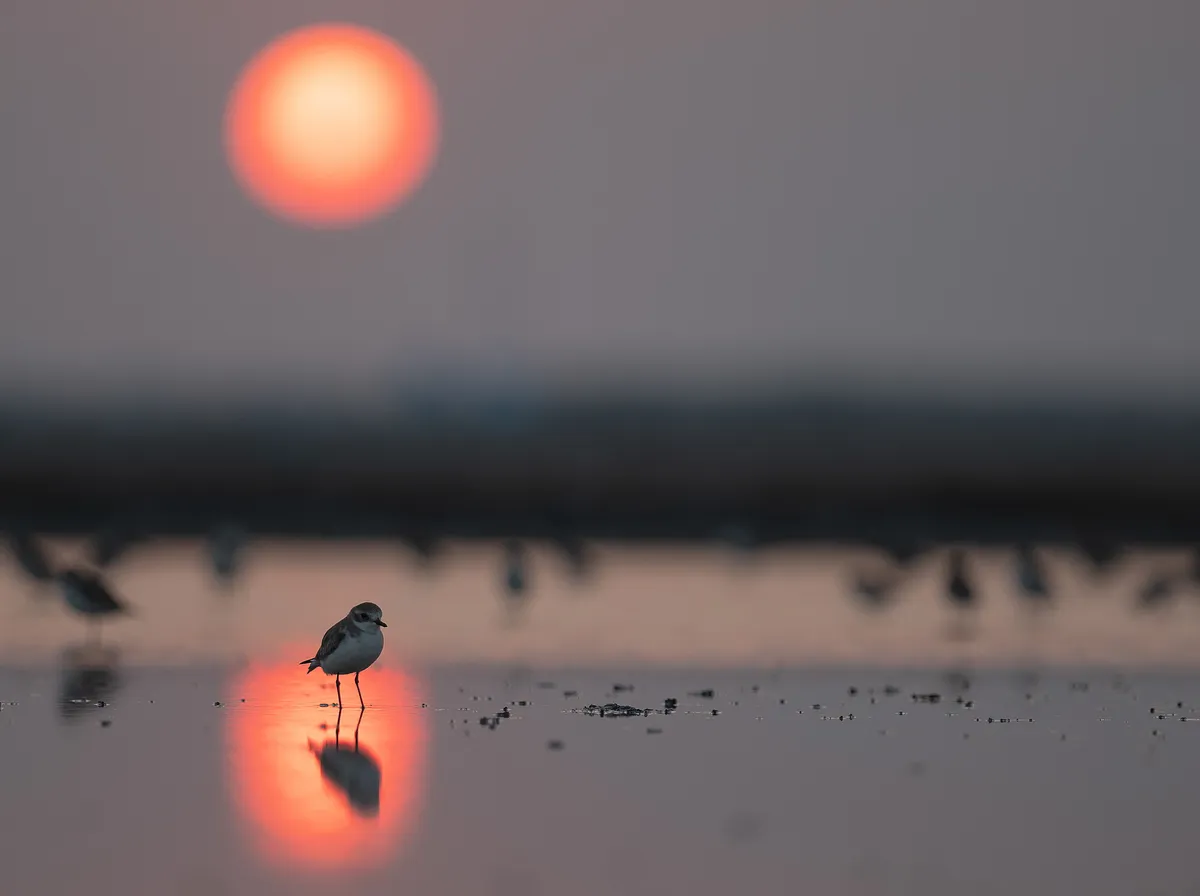
At the end of the day, this area of saltpans took on a beautiful, bright orange-red colour. I love watching the scene of waders foraging in such glorious light. To take this photograph, I lay prone and motionless on a low ridge as there was nowhere else for me to hide. I lay there hoping that the birds would come into the basin just in front of me.
Eventually, my dream came true and the birds finally arrived, right on cue to coincide with the gorgeous sunset light. The sun’s glow contained tints of yellowish, pinkish and orange-red, and this little Kentish plover was perfectly placed in the middle of its reflection on the saltwater surface. You can also get a sense of how shallow the basin was from the size of the bird in relation to those little wads of mud.
Canon R6 with Canon 300mm f/2.8 II lens. Focal length 300mm; 1/500 second; f/2.8; ISO 100.
Category: Young Bird Photographer of the Year, 9-13 years
Gold Award winner
Droplets, by Parham Pourahmad (USA).
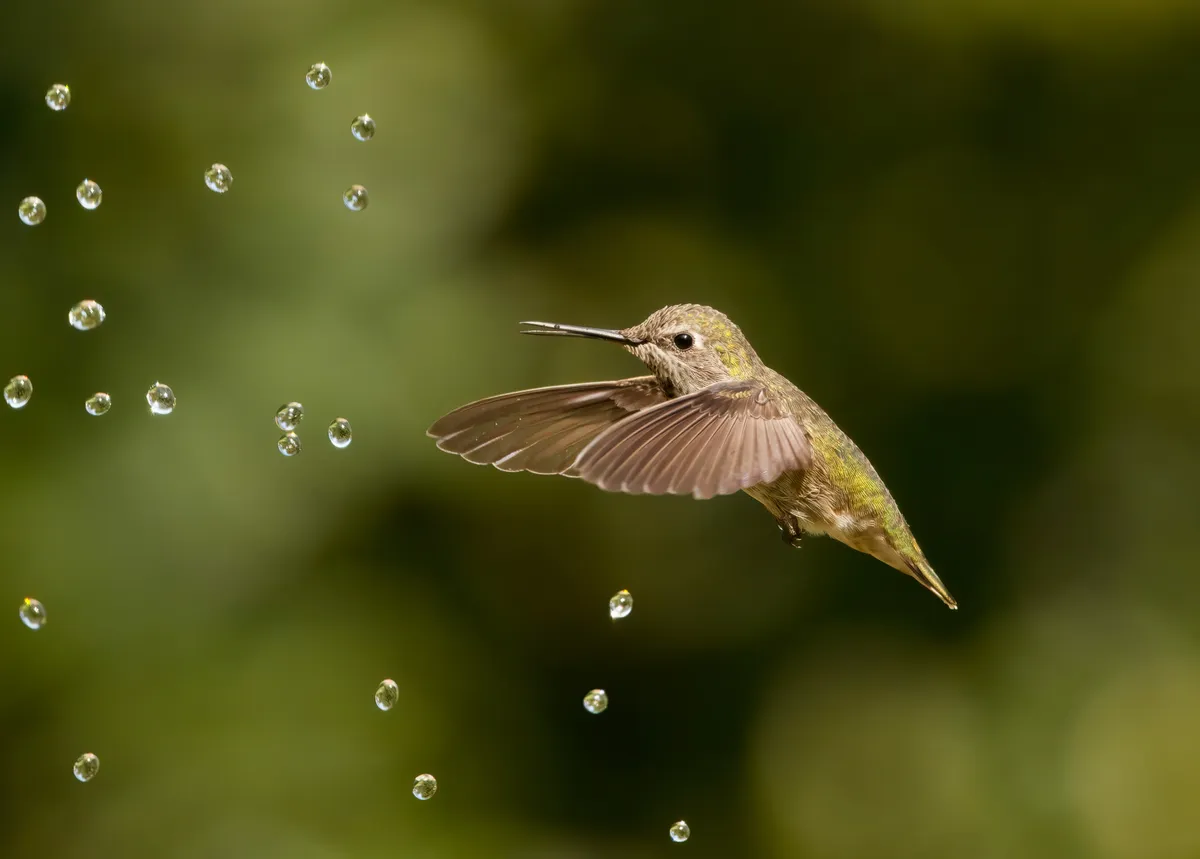
In Fremont there is a water fountain that is a hotspot for hummingbirds. The birds like to bathe in the water, or in this case catch and sip the droplets. When the birds fly around among the droplets, it provides great opportunities for photography. I had to use a very fast shutter speed to freeze the water droplets and the wings of this Anna’s hummingbird.
Nikon D3500 with Sigma 150–600mm f/5–6.3 lens. Focal length 600mm; 1/4,000 second; f/6.3; ISO 2,800.
Silver Award winner
Shadows, by Andrés Luis Domínguez Blanco (Spain).
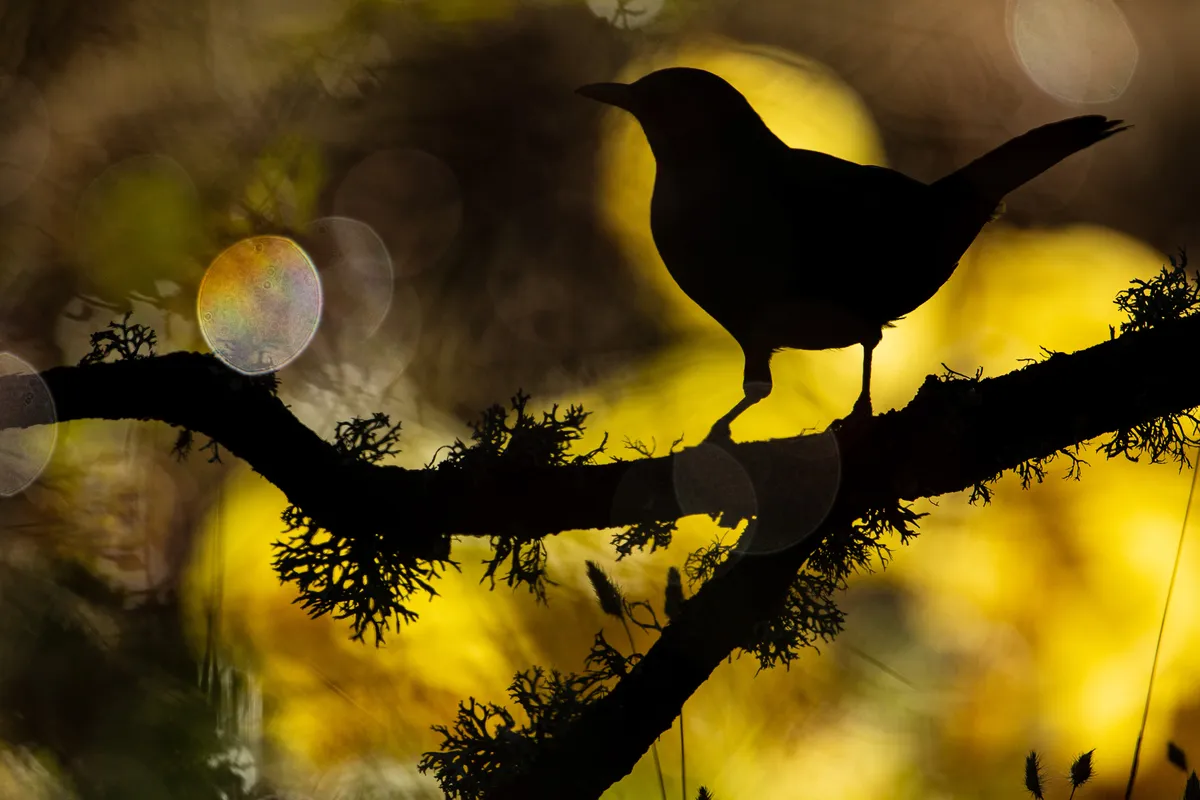
I enjoyed taking this picture of a Eurasian blackbird because at that moment the silhouetted outline of the bird and the illuminated background combined in a pleasing and artistic way. A few out-of-focus dewdrops created circles of bokeh that complement the image.
Canon EOS 5D Mark III with Canon 500mm f/4 lens and 1.4x teleconverter. Focal length 700mm; 1/2,000 second; f/5.6; ISO 800.
Bronze Award winner
Hop, Skip and Jump, by Achintya Murthy (India).
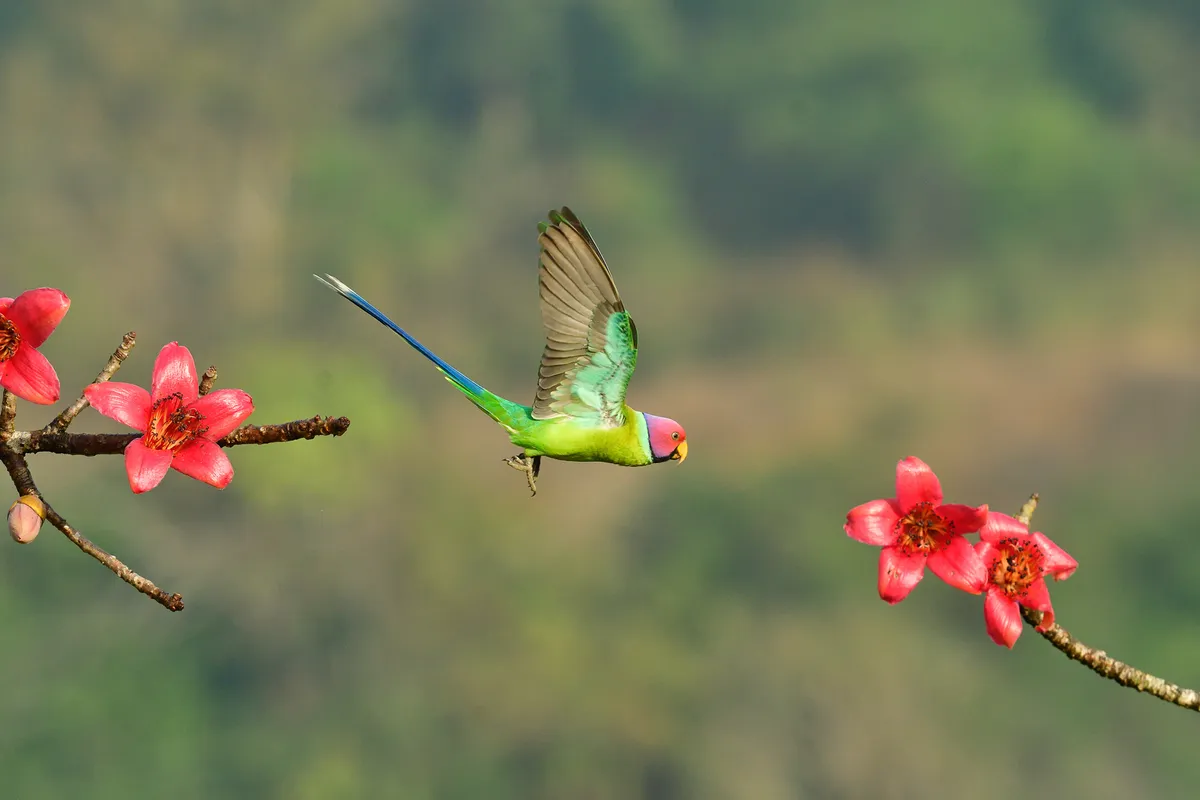
There is a bird hide in the Western Ghats of India that has been installed specifically for observing and photographing parakeets. On the day I visited the site, there was good light, which was an encouraging sign. Aware of this, I set the camera to a high shutter speed and used an autofocus setting with 72 points of focus.
The aim was to get a sharp image of a bird in flight, and I was particularly keen to photograph a plum-headed parakeet. One landed on a crowded perch and, expecting it to fly away from the crowd, I tracked its movement and was able to capture this amazing moment.
Nikon D500 with Nikon 300mm f/4 lens. Focal length 300mm; 1/2,500 second; f/7.1; ISO 1,250.
Category: Young Bird Photographer of the Year, 8 years and under
Gold Award winner
Hoot Are You?, by Arjun Jenigiri (USA).
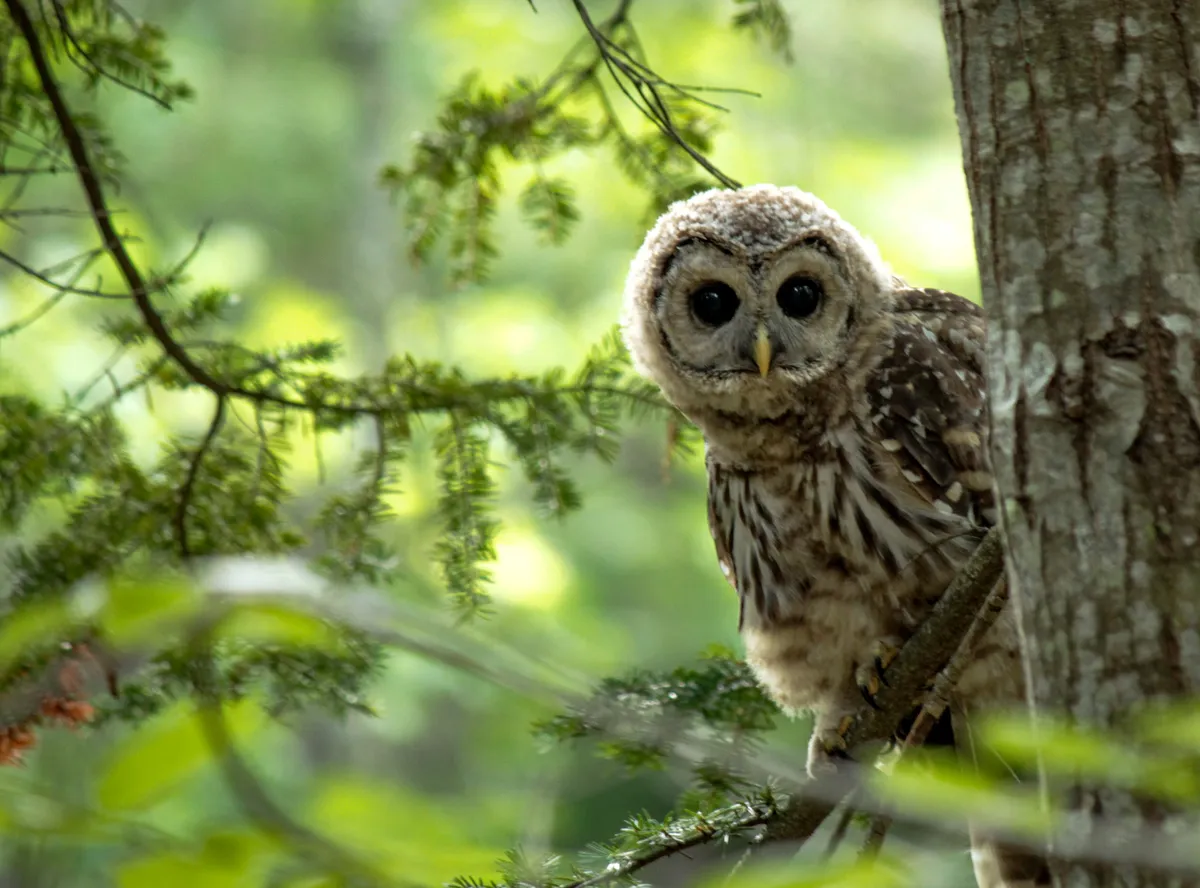
One of my parents’ friends, who lives nearby, took us on a hike to a location where she had seen barred owl chicks earlier in the week. Amazingly, we were just a few minutes into the hike when we heard them calling. Eventually we got to see four owlets, which was amazing.
One landed close by and peered at me from behind a tree trunk in a way that seemed to express curiosity. I was thrilled to be able to capture the moment and pleased that the judges appreciated the photo.
Canon EOS 700D with Canon 55–250mm f/4–5.6 lens. Focal length 250mm; 1/30 second; f/7.1; ISO 1,600
